Russian Oligarchs and Switzerland Oligarchs.ch
Agathe Duparc und Robert Bachmann, 9. May 2022
Bad times for the oligarchs! Since the beginning of the war in Ukraine, this almost exclusively male group of Russian great fortune holders no longer knows which way to turn as they try to save their vast fortune. Here by selling their shares in a group on the quiet without knowing who the new owner really is; there by passing them on to relatives or managers of their business. But as the atrocities of the Russian military against civilian populations in Ukraine continue, the list of those sanctioned continues to expand, in some cases to the wives and children of the oligarchs, who so far were not touched.
A sign that times are difficult: even Switzerland has resignedly agreed to follow the international wave of sanctions, when it had until now opened its banks wide, pledged its neutrality and made an armada of professionals available to Russian billionaires to fulfil their desires. Admittedly, efforts remain sluggish. To date, only CHF 6.3 billion (USD 6.31b) of Russian assets have been seized in Switzerland, including some luxury properties. This is little compared to the estimates provided by the Swiss Bankers Association (SBA), which speaks of CHF 150 to 200 billion (USD 214 billion) deposited in Swiss institutions. There is also some confusion as to which of the cantons or the State Secretariat for the Economy should take the initiative to freeze assets. The latter has published a memorandum. In Europe and the United States, taskforces and initiatives have been set up to hunt down the oligarchs’ assets, in the hope of drying up Putin's war machine and stirring up opposition within the Russian elite. Switzerland seems hesitant: at the beginning of April, a first contact would have taken place with the EU and G7 taskforce according to the FDFA, since then no news.
The hunt promises to be long and difficult. With virtually unlimited means, the oligarchs have become masters in the art of concealing their fortunes, whether this means damage limitation during a costly divorce or escaping prosecution and sanctions. They can count on the valuable help of lawyers, fiduciaries and banks, which provide trusts or offshore arrangements that are much more complex than Russian dolls. Switzerland offers best-in-class “facilitators” of corruption, a perfect blend of competence and discretion.
The Research
Despite this opacity, Public Eye has decided to scrutinise the connections of some thirty oligarchs with Switzerland. These people were selected according to different criteria: their proximity to the regime or their long-standing friendship with Vladimir Putin; their economic weight, also in strategic sectors for the Russian state such as commodities; their ability to obtain public contracts, as well as their contribution to major Kremlin projects. Among these high-profile figures, some have so far passed under the sanctions radar, such as the steel baron Vladimir Lisin. Our list also includes some “outsiders”, such as the warmonger Patriarch Kirill of Moscow and All Russia whose hidden fortune has been the subject of several independent journalistic investigations, as well as close associates of Vladimir Putin who play a more hidden role.
Be they enthusiastic or tacit sponsors of the Kremlin's militaristic and imperialist policies, they all fuelled Putin's war machine. And they have all made sweet Helvetia one of their favourite support bases. The footprint they have left in Switzerland is therefore the decisive criterion for their inclusion in this survey.

Typology of the Oligarchs
The research also allowed to draw up a typology of the way in which these individuals have become richer (see “Russian Wealth: A User's Guide”). Their respective careers are peppered with dark chapters, criminal proceedings and, in some cases, bloody settling of scores. Oil, aluminium, fertilisers, most oligarchs took advantage of the collapse of the Soviet Union to acquire shares in state companies at low cost, to the detriment of the Russian population, which was then suffering all types of deprivations. The paths are diverse, but all of them benefited, at the start of their career, from solid support: links with the governor of a region or a plant manager; support from a minister, secret partnership with a senior civil servant; arrangements with the mafia, etc. Wild privatisations and economic chaos enabled them to push competitors aside and take control of the privatisation vouchers that had been distributed to the population.
Later, with the rise to power of Vladimir Putin in 2000, there was a second wave of oligarchs. The cards were redistributed in the hydrocarbons sector, and fortunes were also been made in construction, agribusiness and telecommunications. They second-wave oligarchs are often men with a KGB background, or who have simply had the chance to be among the old Saint Petersburg comrades of the Russian president, who knows a thing or two about male bonding.
For three decades, Switzerland has offered an ideal and very little regulated environment for Russian wealth.
Geneva, Zug and Lugano in particular are major hubs for commodity traders. Opening a bank account; registering a trading company owned by an offshore company or front men; hiding behind a trust or foundation to conceal the real beneficial owner; acquiring a luxurious property through a relative: all of this is almost child's play. Switzerland has so far offered the dream of paying less tax and discreetly and legally safekeeping profits outside of Russia.
The information we have compiled stems both from open (see list below) as well as confidential, and sometimes exclusive, sources. We have scoured companies, trading houses, non-profit foundations and other entities registered between Geneva and Zug that are in the orbit of billionaires close to Putin. And we have included the real estate they own.
Regarding wealth, we have chosen to indicate the estimates published in 2021 by Forbes magazine. These figures have recently been revised downwards for the most prominent Russian billionaires who, cornered by the sanctions, have sold or transferred part of their assets to third parties. Due to the opacity surrounding their affairs, our mapping is far from complete. It provides however an image of the situation at this moment in time, that is to say two months after the start of the war in Ukraine. Public Eye will add provide updates as regularly as possible.
More infos
-
Sources used
- Forbes list of the 200 richest in Russia (2021).
- Putin’s List (English database of the Free Russia Forum founded by Yuri Kasparov)
- Investigations by Alexei Navalny's Anti-Corruption Fund (FBK)
- Putin. Corruption. An independent white paper (reports and data supplied by Boris Nemtsov, the opponent assassinated in February 2015) Videos
- Russian Asset Tracker (OCCRP database)
- Russia Archive (ICIJ database)
- ICIJ’s guide to Russian wealth hidden offshore
- Panama Papers
- Rupep.org (database of politically exposed persons in Russia and Belarus)
- Russian media like Kommersant, RBK, Novaya Gazeta and Meduza
- International media like Reuters, Bloomberg, Guardian, Le Monde, Mediapart, etc. as well as Swiss media
- Zefix, extracts from the commercial register in Switzerland
Russian Wealth: A User's Guide
Russia is the most unequal country in the world: 1% of the population controls 58.2% of national wealth. The colossal fortunes of the oligarchs have been built by the privatisations and the power shifts.
In 1992, after having privatised small businesses and services, the government of President Boris Yeltsin launched the second wave of privatisations by distributing “vouchers” to the population. This was to allow anyone to become a shareholder in privatised companies. All over the country, young people with ambition who had already embarked on the adventure of “cooperatives” (the first form of private property in the days of the USSR) sensed a good business deal. With the help of factory managers, local officials or the mafia, they managed to buy up all these vouchers, quickly finding themselves sitting on top of considerable fortunes.
The next stage took place in the mid-1990s, when Boris Yeltsin, already unwell and unpopular, wanted to secure his re-election. The Russian state, on the verge of bankruptcy, adopted the highly controversial “loans for shares” scheme. To obtain cash, the Government pledged stakes in the most lucrative Russian companies. A small caste called the Semibankirchtchina – seven extremely wealthy young bankers who had entered the Kremlin – played the lenders. The State would never repay these loans and the lenders, already called “oligarchs”, took over, at very low cost, entire sectors of the Russian economy, in particular oil, metal and minerals.
The rise of Vladimir Putin redistributed the cards. The former KGB officer instructed oligarchs to stay away from politics, to finance certain major Kremlin projects and to submit themselves to the “power vertical”. The Yeltsinian oligarchs, some of whom were arrested or forced into exile, were gradually replaced by businessmen from the secret services or former comrades of the Russian president. It only took a few years for them to become billionaires, with substantial help of state contracts that made their empire flourish.
Gallery of Oligarchs
More infos
-
Alexander Abramov
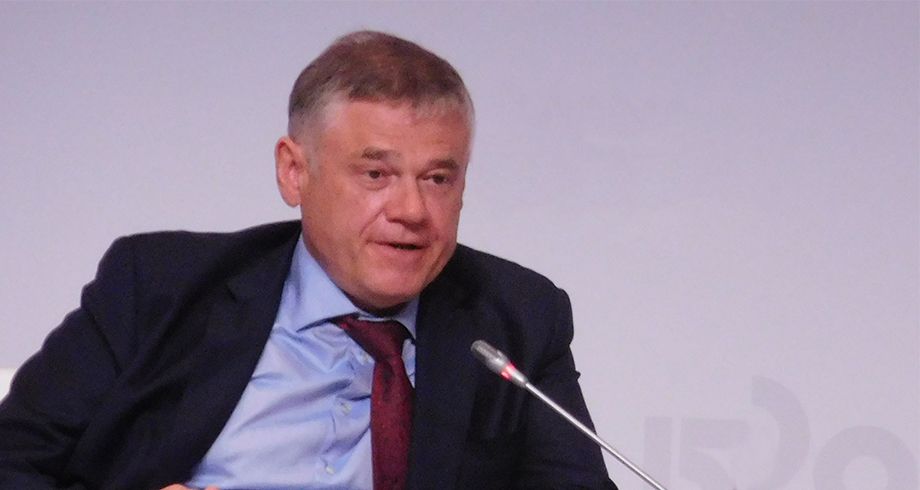 ©
Wikimedia
©
Wikimedia
USD 7.6 billion (Forbes 2021). Under sanctions in Australia.
Born in 1959 in Krasnodar in southern Russia, Alexander Abramov founded (together with his partner Alexander Frolov) what would later become Evraz, a mining giant with interests mainly in steel, coal and vanadium. From trading metals at discount prices to acquiring mines in close collaboration with regional governors, the birth of Evraz is emblematic of how well-placed and connected men were able to enrich themselves after the collapse of the USSR. Now chairman of the group's administrative board, the billionaire holds 19.3% of its shares, alongside Roman Abramovich (28.6%).
In 2019, Abramov was involved in a scandal in Cyprus: according to revelations of the OCCRP, he was the beneficial owner of two front companies very much involved in the “Troika Laundromat”, an international money laundering network which allowed the Russian elite to hide assets and evade taxes. Abramov's two companies had, for unknown reasons, injected more than USD 300 million into this network. The Cypriot law firm that had founded and administered both companies belonged since 2013 to the President of the Republic of Cyprus, Nicos Anastasiades, and his daughters. Interestingly, thanks to this contact, Abramov had obtained Cypriot citizenship through the Golden Passport Scheme. In December 2021, the Cypriot authorities decided to abolish the scheme, half of the passports granted were declared illegal.
Links with Switzerland
- East Metals AG, the trading arm of Evraz, is located in Zug. According to sources seen by Public Eye, East Metal AG trades large quantities of commodities for the group, in particular palladium.
- Open sources indicate the oligarch's closeness to Credit Suisse: in 2007, a senior Credit Suisse executive became the exclusive financial advisor to Alexander Abramov. In 2009, the Swiss bank sponsored the Skolkovo Management School in Moscow, of which Abramov was one of the founders. And in 2019, Credit Suisse – along with UBS and Citigroup – facilitated the sale of a minority stake in Evraz.
- Abramov is a member of the association Good Gear around the World, founded in 2020 in Nyon, whose president is Vasily Shakhnovsky, a former shareholder of Mikhail Khodorkovsky's company, Yukos. Shakhnovsky survived the Russian authorities' attack on Yukos after Vladimir Putin came to power (by paying a USD 1.8 million fine for tax evasion) and went into exile in Nyon, where he has lived for several years. The association aims to organise the first trip around the world through the North Pole and the South Pole without leaving the surface of land or water. In March 2022, a Russian plane involved in the expedition was stopped in Canada for violating airspace restrictions enacted in response to the Russian invasion of Ukraine.
-
Alexey Mordashov
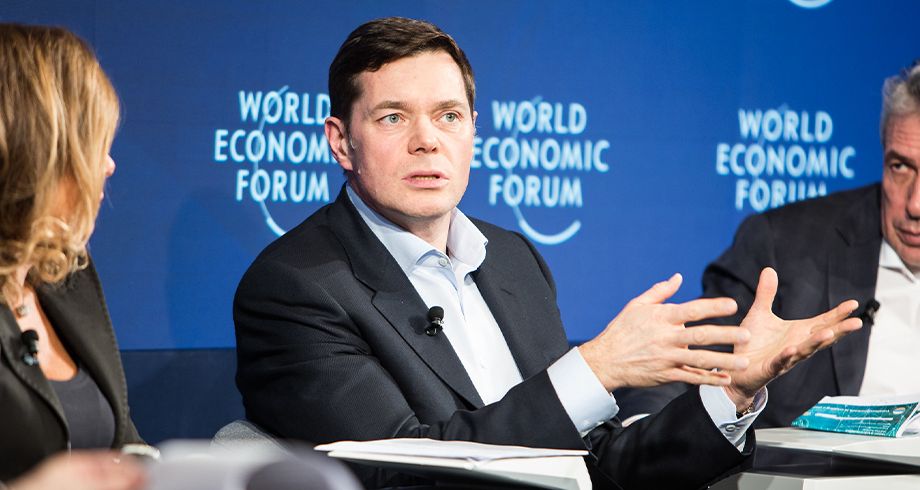 ©
Sikarin Thanachairary / WEF
©
Sikarin Thanachairary / WEF
USD 29 billion (Forbes 2021). Under sanctions in Switzerland, EU, UK, Australia, Japan and Ukraine. Present at the meeting of the oligarchs with Vladimir Putin on 24 February in the Kremlin.
Born in 1965 in Tcherepovets, Alexey Mordashov, a graduate engineer from Saint Petersburg, built his immense fortune in metallurgy. At the age of 28, he became the majority shareholder of the Cherepovets metallurgy plant, after having dismissed the director who had entrusted him with the privatisation of this factory where his parents worked during the time of the Soviet Union. This laid the groundwork for the creation of Severstal group, one of the jewels of the Russian steel industry. Mordashov owns 77% of the group's shares. Before the war in Ukraine, this giant delivered around 3 million tonnes of steel to Europe, i.e. a third of its turnover, which in 2021 amounted to USD 11.3 billion. These exports are now suspended. The group, which also has assets in the United States, has diversified into coal, gold, turbines, retail, travel, media and telecommunications.
A banker from St. Petersburg, the now deceased Vladimir Kogan who himself had economic interests in Switzerland, introduced Mordashov to the future Russian president. In 2003, Mordashov entered an exclusive club: he became co-owner of the Rossiya Bank, whose main shareholder is Yuri Kovalchuk, a longtime friend of Putin. Five years later, the Mordashov participated in the creation of National Media Group (NMG), which holds stakes in television channels and newspapers, such as Perviy Kanal and Izvestia – both part of the Kremlin’s propaganda machine.
The oligarch did try to distance himself from the Kremlin by declaring that the war in Ukraine was “a tragedy for the two brotherly peoples”, but his closeness to the Putin regime is more than proven.
According to the Financial Times, on 28 February, when the first European sanctions fell, Mordashov transferred his 29.9% stake in the German tourism group Tui – which he owns through a Cypriot company – to a British Virgin Islands entity controlled by his third wife. He also handed her a majority stake in Nordgold, his London-based mining company, two weeks before the UK sanctioned him.
After a long cruise in the Seychelles, his 142-metre yacht “Nord” docked in Vladivostok at the end of March. “Lady M.”, his other super yacht, is currently immobilized by authorities in Italy.
Links with Switzerland
- The Severstal group has a branch in the suburbs of Lugano in Ticino: Severstal Export GmbH.
- Alexey Mordashov has links with the mining group Solway Investment Group, based in Zug. In 2015, his investment fund Aterra Capital created a joint venture with Solway to develop the San Jorge project in Argentina. The Kremlin had back then lobbied to support this project. The same partners are also shareholders of de Kaminex Limited, a copper prospecting and mining company in the Democratic Republic of the Congo.
- According to the Tages-Anzeiger, the fiduciary Kendris in Zurich, which since 2009 has been handling Mordashov's affairs, administered two of his offshore companies.
-
Alisher Usmanov
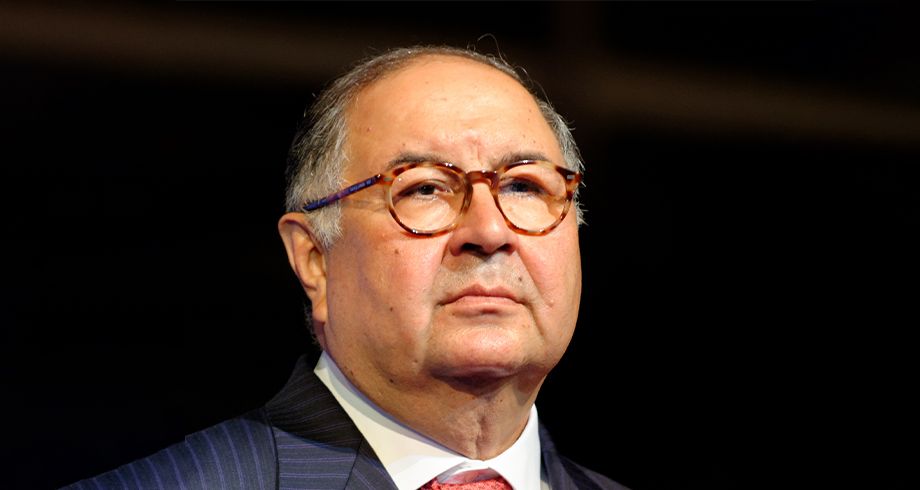 ©
Wikimedia
©
Wikimedia
USD 18.4 billion (Forbes 2021). Under sanctions in the US, EU, Switzerland, UK, Australia, Canada, Ukraine and Japan.
Born in 1953 in the Uzbek town of Chust, Alisher Usmanov graduated from MGIMO, the prestigious school of international relations in Moscow. He however had a thwarted start to his career. In 1980, Usmanov was arrested with two other sons of the Uzbek nomenklatura and sentenced to eight years in prison for corruption and theft of public property. Upon his release from prison in 1986, he moved to Moscow and founded a cooperative (the first form of private property during the time of the USSR), which produced plastic bags and sold tobacco. He's a jack-of-all-trades. In 2000, we find him at the head of Gazprom Investholding, the investment fund of the gas giant Gazprom. He is in the front row to participate in the most interesting deals, taking control of Metalloinvest in 2005 (one of the largest Russian iron and steel producers). Soon thereafter, he created USM Holding together with his partners, which also has interests in copper and cement. Usmanov then later invested in telecom company Megafon. He owns at times 10% of Facebook and controls the economic newspaper Kommersant. He once owned 30% of Arsenal football club in the UK.
In 2017, Alexey Navalny's Anti-Corruption Fund aired an explosive investigation into Prime Minister Dmitry Medvedev's hidden wealth, accusing Usmanov of paying the latter a bribe in the form of a luxurious villa. In a legendary reply, we see the oligarch pretend to spit in the face of the opposition leader and threaten him with lawsuits. Which he did not fail to do, as he achieved a conviction of Navalny for defamation.
Links with Switzerland
- Alisher Usmanov is a major client of Credit Suisse and Julius Baer, according to the Swiss press. From 2012 to 2017, USD 700 million reportedly flowed between his accounts at the two institutions.
- The “Suisse Secrets” investigation revealed that his sister, Saodat Narzieva, an obstetrician-gynaecologist, has accounts with Credit Suisse, through which more than USD 1.8 billion have passed since 2004. She is now under EU sanctions.
- Metalloinvest Trading AG, registered in 2008 in Zug, centrally manages deals between the various entities of Metalloinvest group.
- On 1 March 2022, Usmanov resigned as president of the International Fencing Federation (FIE), based in Lausanne, where he regularly travelled by private jet. He announced that he wanted to challenge the sanctions in court.
- According to Swiss public broadcaster RTS, he once considered buying an apartment near Morges.
-
Andrey Bokarev
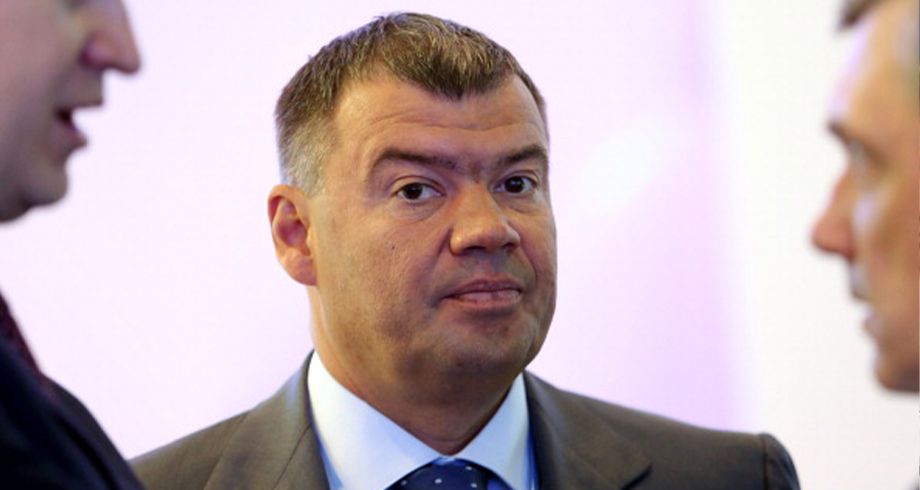 ©
Bloomberg / Getty Images
©
Bloomberg / Getty Images
USD 2.5 billion (Forbes 2021). Under sanctions in the UK, Australia and Ukraine. He participated in the meeting of entrepreneurs in the Kremlin on 24 February 2022.
Born in 1966 in Moscow and nicknamed the “king of public contracts”, Andrey Bokarev belongs since 2014 to the circle of second-tier oligarchs loyal to the Kremlin. With his historical partner, Iskander Makhmudov, the billionaire reigns over Transmashholding, the largest Russian railway services company, number one recipient of contracts by the state Russian railways. He is also a shareholder in the coal company Kuzbassrazrezugol and UGMK, the metallurgy giant.
The rise of the Bokarev-Makhmudvov tandem during the 1990s was shrouded in rumours of complicity with criminal groups. In 1995, the leader of the Orekhovo gang, known as “Sylvester”, died in Moscow when a Mercedes belonging to Bokarev exploded. According to reports, the latter would have represented the commercial interests of the criminal organisation. Makhmudov was suspected of close links with the Izmailovo mafia group, as part of an investigation by the Spanish police.
The Sochi Olympics in 2014 allowed Bokarev to get closer to the Kremlin: UGMK built the “Shaiba” ice arena used for the Winter Games. From that time onwards, the billionaire seems to play an important role in the management of Russian strategic assets.
In 2013, he bought a minority stake in Transoil (an oil transport company), owned by Gennady Timchenko, Putin's close friend. In 2014, when the publicly held weapons producer Kalashnikov was put under sanctions, Bokarev became a 49% shareholder for a short period, thus allowing the group to reorganize. Ultimate transaction: in 2015, the Swiss trader Gunvor (also linked to Timchenko) sold him 74% of the Ust-Luga oil terminal, located on the Baltic Sea.
In March 2022, like many other oligarchs, Andrey Bokarev ceased to be the beneficial owner of his companies. But the identity of the new “owners” is not known.
Links with Switzerland
- UGMK (Ural Metal and Mining Company) is owned by Bokarev and Makhmudov through five offshore companies (two are based in the British Virgin Islands; the other three in Cyprus, Panama and Liechtenstein) – Folkstown Business Inc is the company registered in Liechtenstein.
- The investment company of the Transmashholding group, TMH International AG, is domiciled in Zug.
- Gunvor is a partner of Andrey Bokarev in the Ust-Luga oil terminal. Since the war in Ukraine, Gunvor says it wants to reassess its remaining stake (26%).
- In May 2016, the Russian environmental opponent Konstantin Rubakhin, who fought against one of the ecocide projects of the giant UGMK in the Voronezh region, sent a report to the Office of the Attorney General of Switzerland, which exposed the criminal origins of the wealth of the Makhmudov-Bokarev tandem. Public Eye is in possession of a copy of this letter addressed to Attorney General, Michael Lauber, who never replied.
- The activist described how UGMK accumulated its profits outside Russia, on behalf of trading companies in Switzerland – among others Alpin Group AG (Thun), Umcor AG in Zurich and GGP Metall AG in Biel – then how these funds were used to buy assets in Europe.
- According to an official document produced by Rubakhine, the giant Transmashholding in the hands of the Makhmudov-Bokarev tandem had bank accounts with Credit Suisse Zurich at the time.
- In 1998, a trading company of the Russian coal mining company Kuzbassrazrezugol was registered in the canton of Appenzell: Krutrade AG. Its director was Andrey Bokarev. It has been in liquidation since 2005.
-
Andrey Guryev father and son
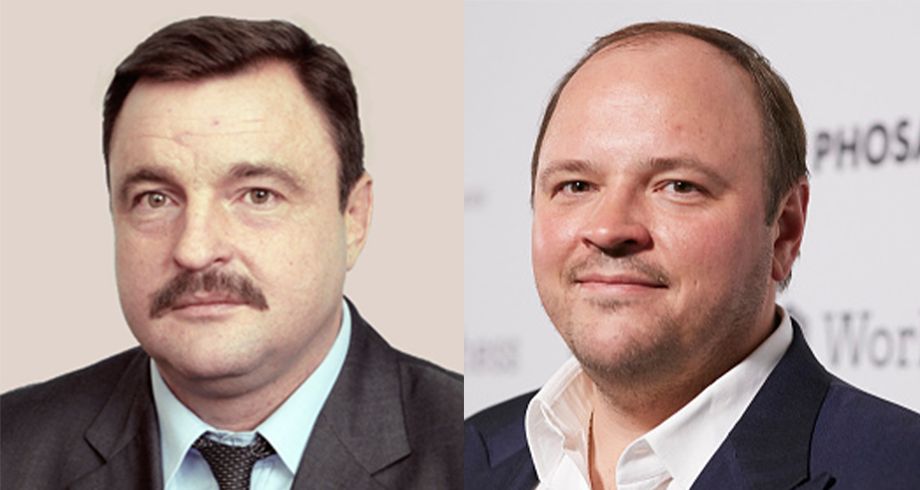 ©
Wikimedia / Sebastian Reuter / Getty Images
©
Wikimedia / Sebastian Reuter / Getty Images
USD 6 billion (Forbes 2021). The son, Andrey Guryev junior, is under sanctions in the EU, Switzerland, UK, Australia and Ukraine.
Born in 1960 in the Moscow region, Andrey Guryev Sr. began his career in 1990 as a data protection expert at Menatep, Mikhail Khodorkovsky's holding company, of which he later became vice-director. In 2005, when the Russian government finished dismantling the empire of Khodorkovsky (who was arrested two years earlier), he took control of Menatep’s subsidiary PhosAgro at a very low price - today the company is the world's largest producer of phosphates.
In parallel, Guryev worked to strengthen his political influence in the Murmansk region, where his company's activities were concentrated. From 2001 to 2013, he was elected member of the Federation Council (the upper house of parliament) for this region in the north-west of the country. According to the press, throughout his term Senator Guryev never made any public intervention in the Federation Council, no doubt caring more for the parliamentary immunity conferred on him by this position.
In 2013, the billionaire transferred his shares to his son, Andrey junior, who made a career in PhosAgro and who is now placed under Swiss sanctions.
To ensure government support, the Guryevs built a luxurious fishing cabin in Murmansk for Dmitry Medvedev, the former Russian president and prime minister. They also offered 10% of the shares in PhosAgro to Vladimir Litvinenko - who did not have the means for such an acquisition -, the doctoral supervisor of Vladimir Putin when he was a student in Saint Petersburg. Litvinenko has meanwhile become a billionaire himself.
The Guryev family lives in London in a residence that previously belonged to a cousin of Syrian President Bashar Al-Assad. In March 2022, Andrey Guryev junior resigned from his position as Director of PhosAgro. He now has plenty of time to enjoy his huge London palace.
Links with Switzerland
- According to Bloomberg, the Guryev family owns 56.5% of PhosAgro through two holding companies in Switzerland: Chlodwig Enterprises SA and Adorabella SA, domiciled at Dammstrasse 19 in Zug (an address they share with 418 other entities).
- Zug is also home to two other companies of the PhosAgro group: PhosAgro Trading SA and PhosAgro Logistics SA, which deal respectively with trading and transport.
- The gigantic Guryev family palace in London is owned through the shell company Safran Holdings Limited in the British Virgin Islands (BVI). Safran Holding SA is registered in Geneva and is a partner, according to the commercial register, of a real estate company in Gstaad, Hanseli Immobilien GmbH.
-
Andrey Melnichenko
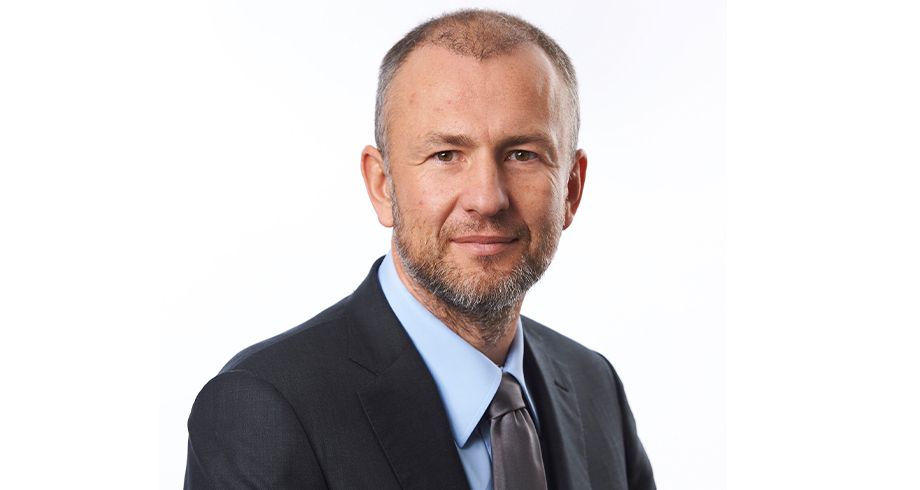 ©
Wikimedia
©
Wikimedia
USD 17.9 billion (Forbes 2021). Under sanctions in the EU, Switzerland, UK, Australia and Ukraine. He participated in the meeting of entrepreneurs with Vladimir Putin in the Kremlin, on 24 February 2022.
Born in 1972 in Gomel (Belarus), Andrey Melnichenko is resident in St. Moritz, and his main asset, the global fertilizer producer EuroChem, is domiciled in Zug. But the oligarch prefers the jet-set and spends a lot of time on one of his yachts – the largest private sailboat in the world, seized by the Italian authorities in March 2022. According to Russian media, this nomadic life would allow him also to escape the Russian tax authorities, as he can hold assets in offshore structures outside the country, which is more difficult when you reside in Russia.
After the fall of the USSR, Melnichenko first business venture was the opening of a currency exchange office at his university. In 1993, he co-founded the MDM bank, one of the silver bullet that allowed many Russian oligarchs to get rich. He was therefore able to invest in industry and created three companies: EuroChem (fertilisers), SUEK (coal) and TMK (manufacturer of tubes for pipelines). In 2006, he sold his shares in TMK to Dmitry Pumpyansky.
The young businessman learnt very quickly which side to stand on. According to an investigation by the programme Mise au Point on the Swiss broadcaster RTS, Vladimir Putin was invited to his sumptuous wedding on the Côte d'Azur in 2005. For the occasion, an Orthodox chapel had been directly imported from Moscow.
Andrey Melnichenko's spokesperson says that “Andrey Melnichenko is a self-made entrepreneur. He has no political influence and had not participated in post-Soviet privatisations and, therefore, is not an oligarch”.
Links with Switzerland
- The head office of Eurochem Group AG is located in Zug, as well as its trading subsidiary EuroChem Trading GmbH. Andrey Melnichenko is the founder and main shareholder through a Cypriot company, AIM Capital (apparently, two additional shell companies hide the real beneficiary).
- On 10 March 2022, Eurochem announced that the oligarch had withdrawn from the capital “as principal beneficiary” effective 9 March. The new beneficiaries remain unknown to the public. The Swiss State Secretariat for Economic Affairs SECO, however, confirmed to EuroChem its status as an unsanctioned entity, after the company claimed that it did not benefit sanctioned persons.
- The IPO of EuroChem was planned for 2022, and was to be facilitated by UBS in particular. This operation, announced at the end of 2021, is likely to be postponed.
- Melnichenko also owns 92% of SUEK (also through AIM Capital), its trading arm is located in Zug. Melnichenko has “withdrawn from the beneficiaries of the SUEK group”. The new owners are unknown.
- Before the war in Ukraine, Melnichenko was a resident of St. Moritz, which in principle required him to spend 180 days a year in Switzerland. It's impossible to know how much his tax package amounted to, but it's a safe bet that the aggressive optimisation strategies the oligarch used in Russia were also effective in the Swiss canton of Graubünden. The day before sanctions were introduced, Melnichenko's jet left Zurich for Tanzania.
-
Andrey Skoch
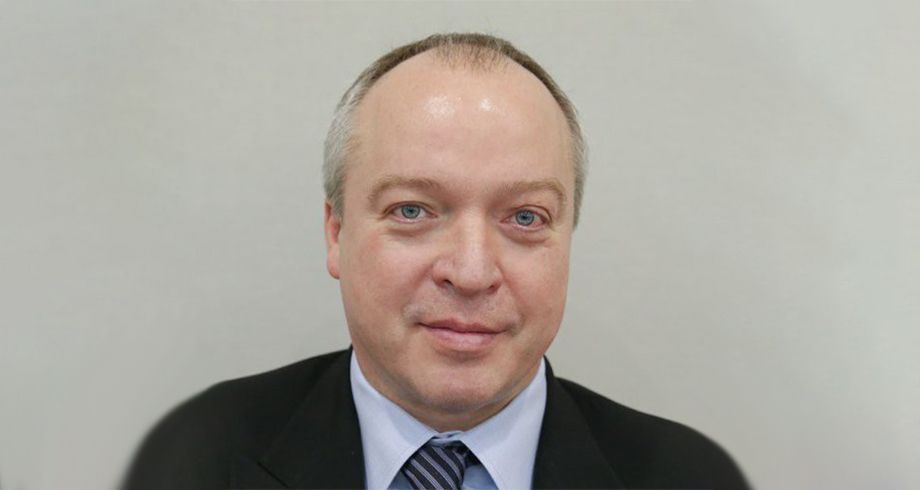 ©
Duma.gov.ru / Wikimedia
©
Duma.gov.ru / Wikimedia
USD 8.6 billion (Forbes 2021). Under sanctions in the EU, US, UK, Switzerland, Australia, Canada, Japan and Ukraine.
Born in 1966 in the Moscow region, Andrey Skoch is Alisher Usmanov main partner. Since the end of the 1990s, he has combined business and politics, firmly installed in his seat as a member of the Duma, the Russian parliament, where he represents the presidential party.
During the privatisations, Skoch invested in a metallurgical company in the Belgorod region, on the Ukrainian border. He then met Usmanov. From this period also date the numerous allegations about his links with the Solntsevo mafia, which was then rampant in Moscow around Sergey Mikhailov – the businessman tried in Geneva in 1998 but finally acquitted after all the witnesses retracted their statements.
Since then, Skoch has been fighting a constant battle to silence these rumours. He even appealed to the former head of French internal intelligence Bernard Squarcini in order to whitewash his image in France.
Skoch owns 30% of USM Holding, a conglomerate that includes Metalloinvest (one of Russia's largest mining companies), MegaFon (national telecommunications operator) and Mail.ru (internet service provider), and invests in various sectors, such as the Moscow Vnukovo Airport.
After his election to the Duma in 1999, Andrey Skoch transferred all his shares to his father, Vladimir. In 2020, after the 2018 US sanctions, Vladimir Skoch donated 50% of his shares to his granddaughter, Varvara Skoch, Andrey's then 20-year-old daughter. The Skoch family is therefore experienced in the management of assets in the event of sanctions.
Links with Switzerland
- Zug is an important base for the Metalloinvest group. Metalloinvest Trading AG and Metalloinvest Logistics AG are registered there. Metalloinvest Trading AG is the main trading subsidiary of the group. It manages both transactions between the various Metalloinvest companies and sales to external clients. Metalloinvest Logistics organises the transport of products around the world.
- As the “Suisse Secrets” investigation revealed, Credit Suisse opened numerous accounts associated with USM Holding between 2004 and 2014. The Swiss giant was part of the group of banking establishments that maintained a credit relationship with Metalloinvest in 2014, just after the annexation of Crimea.
- In 2019, Basel-based duty-free company Dufry entered into a partnership with Andrey Skoch, buying 60% of Regstaer-M, a Russian company that controls duty-free shops at Moscow Vnukovo airport and whose beneficial owner is Vladimir Skoch, Andrey's father.
-
Anna Tsivileva, born Putina
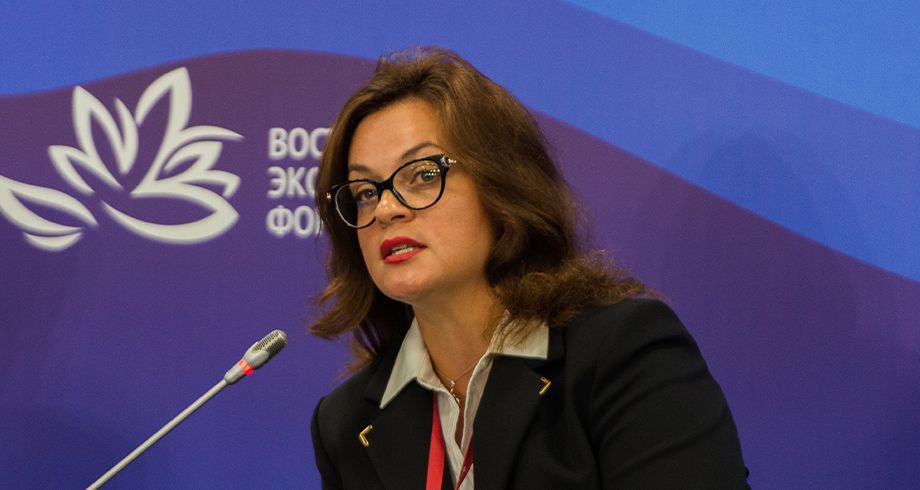 ©
Shutterstock
©
Shutterstock
Fortune unknown, no sanctions.
Born in 1972 in Ivanovo, Anna Tsivileva is the daughter of one of Vladimir Putin's cousins. She first led a quiet career as a psychiatrist in a hospital built on the outskirts of Ivanovo in the northeast of Moscow. But as soon as the illustrious member of her family was elected president in 2000, she headed for Moscow. The young woman's business and fortune took off, as the daily Le Temps recently reported, which is based on a very detailed investigation published in January 2022 by the Agents Media site.
Anna first embarked on the purchase of medical equipment before she bought, from 2012 onwards, coal assets together with her husband Sergey Tsivilev, who became a shareholder in Kolmar, a coking coal mining and processing company in the Republic of Sakha in Russia and which today is valued at USD 2.5 billion (not to be confused with Kolmar Group AG).
It really is a small world. At the time, Kolmar was also owned 60%, in equal shares, by Volga Resources, the holding company of Gennady Timchenko, the billionaire and close friend of Vladimir Putin, and by Gunvor, the trading company he co-founded and which is based in Geneva. Gunvor sold his share in April 2015 to another oligarch, Andrey Bokarev.
The sleight of hand between shareholders apparently continued in complete opacity. In 2018, propelled to the head of Kolmar, Putin's little cousin recovers the shares of her husband, who has just been appointed governor of the coal region of Kemerovo. According to a document consulted by Le Temps, at that time she owned 70% of Kolmar, while the rest was held by Timchenko.
Links with Switzerland
- Switzerland is home to Kolmar's trading subsidiary KSL AG (Kolmar Sales and Logistics), registered in Zug in April 2016.
- From April 2016 to February 2018, Anna Tsivileva was Chairman of the Board of Directors of KSL AG, exclusive reseller of Kolmar. Her husband also appeared in the commercial register. But in 2018, he told Reuters he sold the asset to a third party whose identity remains unknown.
-
Arkady and Boris Rotenberg
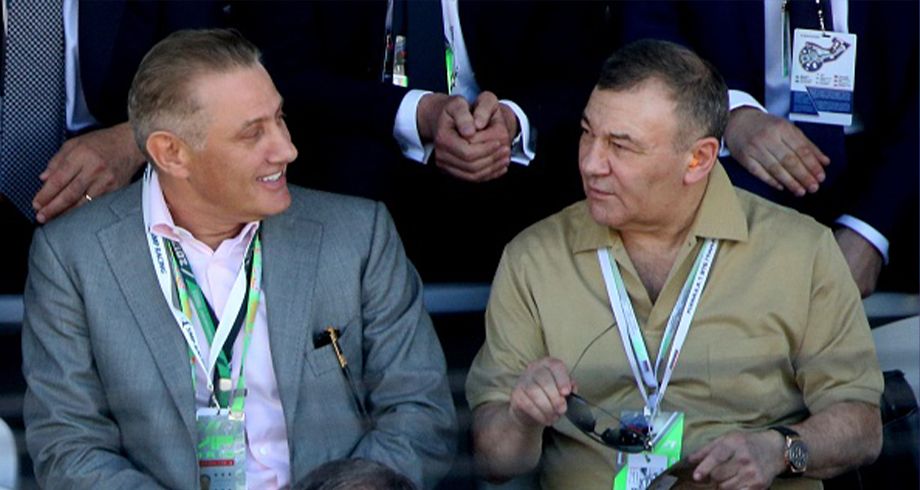 ©
Mikhail Svetlov / Getty Images
©
Mikhail Svetlov / Getty Images
Arkady Rotenberg, USD 3 billion (Forbes 2021). Boris Rotenberg, USD 1.1 billion (Forbes 2021). Under sanctions in the US, EU, UK, Switzerland, Australia, Canada, Japan and Ukraine.
Both born in Saint Petersburg, Arkady Rotenberg (1951) and his brother Boris (1957) are childhood friends of the Russian president. They grew up together and enjoyed the sport of judo. The election of Vladimir Putin in 2000 was their golden opportunity, as their businesses and fortunes began to take off.
In 2008, Arkady, who until then had been a modest businessman, created the Stroygazmontazh Group (SGM), which then had six construction companies specialising in pipelines, and whose main client was Gazprom. It was SGM that built the bridge connecting Crimea to the Russian Federation through the Kerch Strait. The company was sold in 2019 for USD 1.2 billion to a subsidiary of Gazprom.
Now a 94.1% shareholder in the construction giant Mostotrest, Arkady has won the most lucrative government contracts, such as the construction of the new Moscow-Saint Petersburg motorway. From 2006, this route, which passes through the Khimki forest, near Moscow, provoked strong opposition. A local journalist who denounced corruption, Mikhail Beketov, was beaten up and died of his injuries a few years later. The Sochi Olympics increased his fortune. As opponent Alexey Navalni's corruption map shows, Mostotrest built 17 km of steep road from Sochi for USD 2.5 billion.
Arkady is also a shareholder in the Moscow airport of Sheremetevo as well as in a fertiliser company (Minudobreniya). He also claims to be the “real” owner of “Putin's palace” on the Black Sea coast. With his brother Boris, who is more discreet and who is also under Swiss sanctions, he owns SMP Bank – both in equal shares.
Links with Switzerland
- An investigation by the Tamedia group, based on the “Panama Papers”, reveals that in 2012, one of the Rotenberg brothers' offshore companies – Highland Ventures – opened bank accounts in Switzerland through the Geneva wealth management provider Dôme Capital Partners.
- Putin's two childhood friends allegedly, among other things, deposited their money (hundreds of millions of Swiss francs) at the Geneva subsidiary of Société Générale and at the private bank Edmond de Rothschild. Tens of millions would still have landed in this Geneva institution in 2015, after the first American sanctions against Arkady.
- Arkady Rotenberg is still a member of the executive committee of the International Judo Federation, based in Lausanne. From 2013 to 2020, he was a part of the management of the SportAccord association, also based in Lausanne.
-
Dmitry Rybolovlev
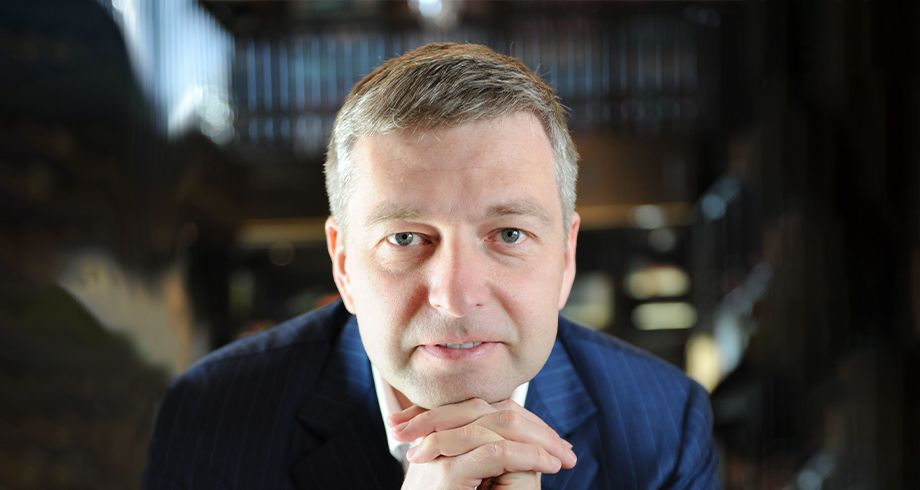 ©
Wikimedia
©
Wikimedia
USD 6.7 billion (Forbes 2021), under sanctions in Ukraine.
Born in 1966 in Perm (Urals), Dmitry Rybolovlev, a doctor by profession, went into business selling beer. Then, in the mid-1990s, the future oligarch bought several potash mines in Berezniki near Perm, which would become the giant Uralkali. He then benefited from the support of a former military official, the second-in-command of the state fund for privatisations in the Perm region.
In 1996, Rybolovlev was suspected of having had the director of a company, that had subsequently come under his control, assassinated. Imprisoned for almost a year, he was finally cleared. In 2003, he moved with his wife and children to Cologny near Geneva.
He then controlled 80% of the shares of Uralkali (the leading Russian producer of potash-based fertilisers) through Matura Holding in Cyprus. More than 80% of production is exported, among others, via Uralkali Trading SA, a trading company based in Lancy, Switzerland.
After a serious accident in one of his mines, he was put under pressure by the Kremlin. The fertiliser magnate sold his shares in 2010 to Suleyman Kerimov for USD 5 billion. In 2011, he left Switzerland to settle in Monaco, caught in numerous scandals. His wife Elena, still resident in Geneva, filed for divorce, claiming CHF 6 billion (she obtained around 800 million). She then revealed how her husband hid his fortune – including a collection of paintings – in a trust. In Monaco, where he has forged close ties with the police and the justice system, Rybolovlev manages to have his art dealer Yves Bouvier arrested, before being caught up in the “Monaco Gate” scandal himself. Since 2018, an investigation has targeted him for “active corruption” and “influence peddling”.
His ties with the Kremlin have grown stronger over the years. His friend and protector Yuri Trutnev (the former governor of Perm) is Putin's special representative in the Vladivostok region. According to an investigation of French Mediapart, the duo would still have joint projects in Russia. Rybolovlev's name appears in the “Putin Accountability Act”, a US Congress list that identifies figures to be sanctioned because of their closeness to Putin.
Links with Switzerland
- In September 2021, the Geneva courts dismissed Rybolovlev's complaint against his art dealer Yves Bouvier. The oligarch appealed against this decision.
- The “hole in Cologny” was filled in 2016. Since 2008, this huge construction site, which revealed a gaping hole in the hillside, had been stopped because of divorce proceedings. The Rybolovlevs wanted to build a replica of the small Trianon of Versailles.
- This plot now belongs to Elena Rybolovleva who also owns another luxurious villa in Cologny where she has domiciled her cultural foundation. In 2017, the ex-wife of the oligarch obtained Maltese citizenship with her daughter Anna. She appears in the Forbes list with a fortune of USD 600 million and sponsors the Bellerive festival.
-
Dmitry and Alexander Pumpyansky
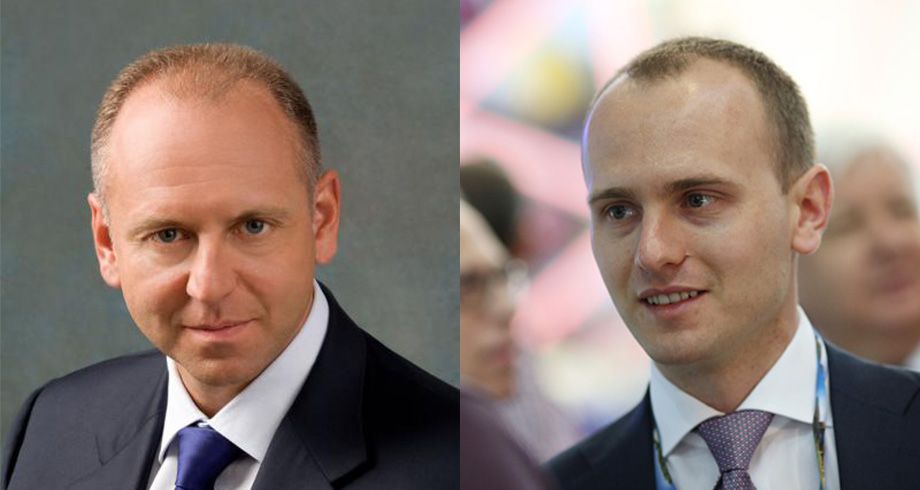 ©
Wikimedia / Chris Ratcliffe / Bloomberg
©
Wikimedia / Chris Ratcliffe / Bloomberg
USD 2.4 billion (Forbes 2021). Under sanctions in the EU, UK, Switzerland, Canada, Australia and Ukraine. Pumpyansky senior was present at the meeting of the oligarchs with Vladimir Putin on 24 February in the Kremlin.
The Pumpyanskys are lovers of wine and pipelines. Born in 1964 in Ulan-Ude, Buryatia, Dmitry, the father, co-founded – together with his billionaire friend Andrey Melnichenko - TMK, the largest manufacturer of metal pipes for the oil and gas industry in Russia. He now owns 95.6% of the shares of this company, which has 15 factories in Russia, Romania and Kazakhstan, and controls 23% of the Russian market and 14% of the global market for seamless pipes. In 2007, during the IPO of TMK which was co-facilitated by Credit Suisse, Dmitry Pumpyansky managed to raise almost a billion dollars.
His son, Alexander, who survived a plane crash in which he piloted in 2012, takes care of the family group Sinara from Geneva, active in transport engineering, finance, energy and agribusiness. The Pumpyanskys also bought two wine estates in the south of France and in the Jura in the year 2000, both were sold a few days before sanctions were imposed. They also control the SKB Bank.
Dmitry Pumpyansky is one of the Kremlin's favourite oligarchs. Putin received him one-on-one in the Kremlin and repeatedly awarded him the Order for Merit to the Fatherland. The last time was in October 2021, for his “great contribution to the development of national transportation engineering and many years of conscientious work”.
On 10 March, the Pumpyanskys resigned from TMK's board of directors. They then transferred their assets within TMK and Sinara to several senior executives. The 72-metre family yacht, “Axioma”, has been immobilised in Gibraltar.
Links with Switzerland
- Alexander Pumpyansky, who studied in Switzerland, has been a resident of Geneva since 2002. He has dual Russian and Swiss nationality. Before the sanctions, he was a director of Segilo SA, in Zurich, of Domus Flavia Investments AG in Geneva, of Lera Capital SA (both real estate companies), an asset management company, as well as of the wealth management company Sinara SA. He has since resigned from all his positions.
- Alexander owns an apartment in Geneva and a villa in Chêne-Bougerie which, according to Tribune de Genève, were seized following the sanctions.
- In an interview with Tribune de Genève, Alexander confides that all his Swiss bank accounts are blocked and that the “service providers” have stopped working with his family. Even lawyers “avoid him because of reputational risk”.
- Before the sanctions, Dmitry Pumpyansky cultivated his links with the Swiss authorities. In March 2020, the Swiss Ambassador to Russia Yves Rossier visited one of its railway equipment manufacturing plants in the Kaluga region, stating that there was “great potential for collaboration” with Swiss companies.
-
Evgeny Kogan and family
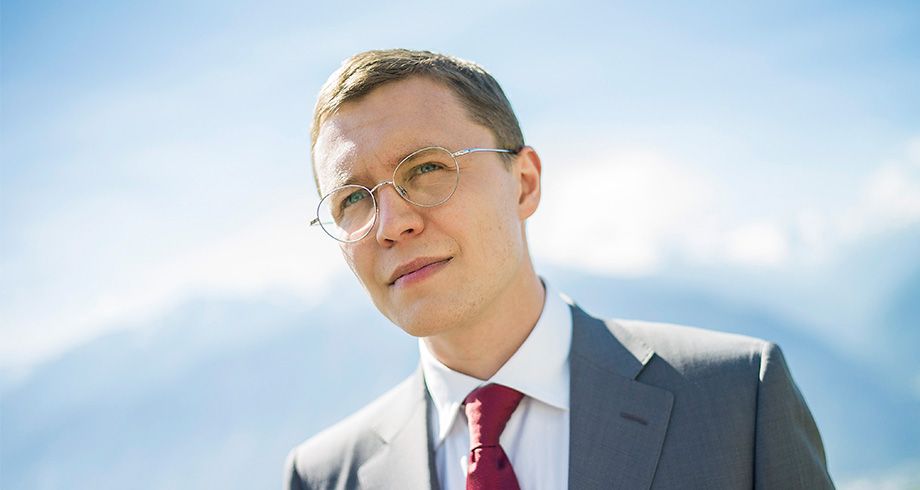 ©
Olivier Maire / Keystone
©
Olivier Maire / Keystone
Evgeny Kogan, heir to Vladimir Kogan (died in 2019) USD 1.1 billion (Forbes 2018). No sanctions
The Kogan family made Switzerland their rear base, buying a chalet on the heights of Crans-Montana in the 2000s. In 2013, while residing in Switzerland, Evgeny, who was then only 24 years old, established himself as the main investor in the mega real estate project of Aminona (canton of Valais), which as of today has not been started.
His father, banker Vladimir Kogan – who died of a heart attack in 2019 – was an old acquaintance of Vladimir Putin. A majority shareholder of Promstroybank in Saint Petersburg in the 1990s, he crossed paths with the future Russian president, who was a client of this institution. The two men remain on good terms. In 2004, Kogan father hit the jackpot by selling 75% of his shares to the state bank for foreign trade (VTB). He alternated his activities as a businessman with those of a senior civil servant. Between 2008 and 2011, he headed the construction department of the Ministry of Regional Development, notably in charge of a gigantic project: the construction of dykes in Saint Petersburg. He was then named number two in the same ministry until December 2012. In the Russian press, Vladimir Kogan won the title of “the richest minister in the government”.
In 2015, he took control of 82% of the Uralsib bank, then on the verge of bankruptcy and which had just been placed under the control of the Central Bank. After his death, his wife Ludmila inherited his shares. But his sons, in particular Evgeny, who resides in Switzerland, manage the banking institution.
Links with Switzerland
- Evgeny Kogan, who has both Russian and Cypriot nationalities, lives in Crans-Montana. He is now the sole director of Aminona Luxury Resort and Village SA. This company was registered in 2007 to pilot the construction of the “Village Royal”, a gigantic real estate project estimated at CHF 650 million, which provides for the construction of 14 hotel buildings with a capacity of 315 rooms.
- The Kogan family has already purchased 50,000 m2 of land. They would have committed a total of CHF 100 million. The foundations have been built but, since 2017, the site has been stopped for lack of financial guarantees, revealing gaping holes.
- According to a recent investigation of Swiss broadcaster RTS, the resumption of work is scheduled for the end of May 2022. The municipality requires, by this deadline, a deposit of CHF 7.5 million.
-
Gennady Timchenko
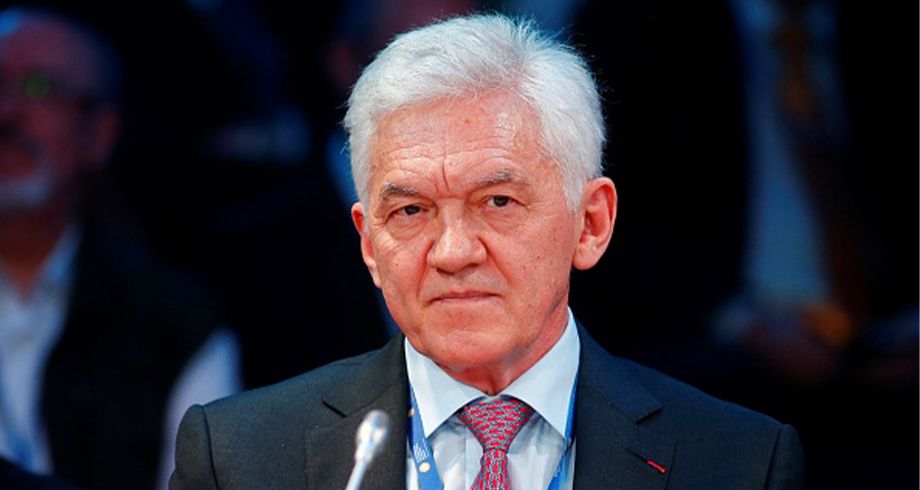 ©
Sefa Karachan Anadolu / Getty Images
©
Sefa Karachan Anadolu / Getty Images
USD 22 billion (Forbes 2021). Under sanctions in the US, EU, UK, Switzerland, Australia, Canada, Japan and Ukraine.
Born in Armenia in 1952, Gennady Timchenko began his career as a trader at the Kirichi refinery in Saint Petersburg. He then befriended Vladimir Putin, at the time head of the Foreign Relations Committee within the municipality. After a spell in Finland, where he obtained citizenship in the early 2000s, he headed for Geneva with his family. His oil trading company Gunvor was then completely unknown. Four years later, Gunvor became the record seller for state giant Rosneft, exporting about a third of Russia's oil.
Timchenko has a sense of timing. In 2014, a few hours before the US sanctions fell (in response to the annexation of Crimea), he announced that he had sold his shares (44%) in Gunvor to his Swedish partner Torbjörn Törnqvist. He then left Switzerland, slipping wonderfully into the costume of the patriotic oligarch. The Kremlin entrusted him with a mission: to develop economic relations with China. After the adoption of a law encouraging Russian businessmen to repatriate their assets to the country, he was one of the first to comply, transferring them from Cyprus to Russia. It is through this holding company that he owns shares in the largest private Russian gas producer Novatek (23.49%), Sibur (17%), Stroytransgaz (53%) and Transoil (80%). Timchenko left the board of directors of Novatek on 9 March 2022.
He shares a passion for judo and ice hockey with Vladimir Putin. According to opponent Alexey Navalny, he is one of the financiers of Putin's Palace.
Links with Switzerland
- In 2002, the oligarch bought himself a villa in Cologny for CHF 18.4 million, equipped with an indoor tennis court. According to the land register, in 2015 he donated this property to his wife Elena (under sanctions in Switzerland since 13 April 2022) and his son Ivan, who still live in Switzerland. Ivan Timchenko (27 years old) also owns an apartment in Cologny, thanks to a donation made by his father the same year. These properties have been frozen by authorities, according to Tribune de Genève.
- According to documents obtained after residents' checks, Gennady Timchenko is still a resident of Cologny (with his Finnish passport), but several sources indicate that he has hardly set foot in Switzerland since 2014.
- After US sanctions came into effect in 2014, his accounts with Credit Agricole Genève and BNP Paribas (Suisse) SA were blocked. The latter maintained the receivership, pushing Timchenko to take legal action, as revealed by the Swiss media outlet Gotham City. The oligarch then called on the same Geneva lawyer who also handles Vladimir Lisin’s business in Switzerland.
- According to a survey by Swiss Tamedia, Timchenko also had accounts at the Edmond de Rothschild bank between 2013 and 2017, opened via the Geneva-based wealth management company Dôme Capital Partners.
- In 2008, Elena Timchenko registered the Neva Foundation, which has funded around 100 cultural events in Switzerland.
- Several subsidiaries of companies in which Gennady Timchenko is a shareholder are based in Switzerland: Novatek Gas & Power GmbH and NOVATEK GAS & POWER ASIA PTE. LTD., Singapore, Zug in Zug and Sibur Investments AG in Baar.
-
Igor Makarov
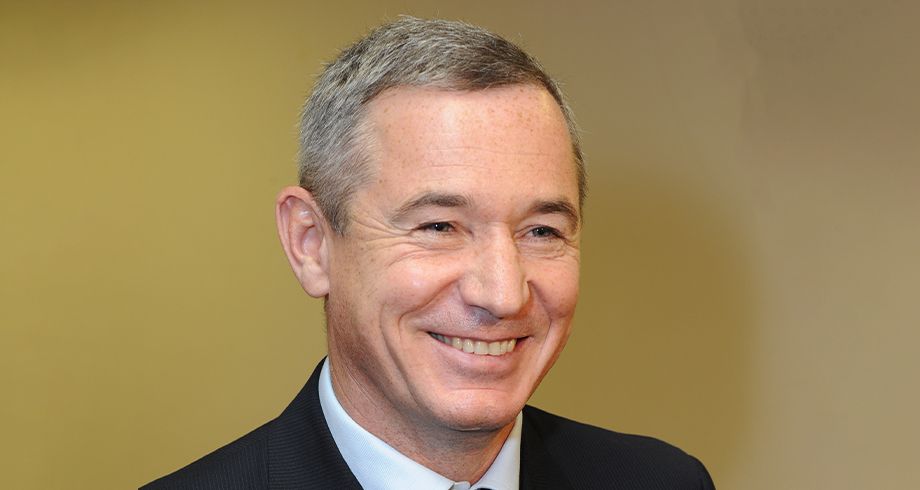 ©
Wikimedia
©
Wikimedia
USD 2.1 billion (Forbes 2021). Under sanctions in Australia and Canada.
Born in 1962 in Ashgabat, Turkmenistan, Igor Makarov was a cycling enthusiast in his youth, but he turned to business very early on, starting his career selling sportswear and souvenirs that he produced himself. In the 1990s, he met Rem Viakhirev, the all-powerful director of Gazprom at the time, and his business took off.
In 1992, he created ltera, his business group which is based in Florida and controlled by four offshore companies (British Virgin Islands). Five years later it had become a major player in the gas sector. Itera ranked second behind Gazprom in gas production and supply to the former Soviet Union, then Turkmenistan's main gas exporter. Itera controlled several large deposits in Siberia. According to several Russian media, among its secret shareholders were members of the senior management of Gazprom.
After coming to power, Vladimir Putin put his men at the head of Gazprom and Igor Makarov's star began to fade. In 2013, he was forced to sell his empire to the state oil giant Rosneft, pocketing between 3 and 4 billion dollars.
In 2015, the oligarch registered a new group called Areti (Itera backwards) whose head office is in Switzerland. He has invested more than a billion in an investment fund - Pangeo Capital - which has interests in telecoms, real estate and finance.
In 2017, Areti acquired 50% of the capital of New Stream, the largest group of Russian private companies controlling the production, refining (including the Antipinsky oil refinery in Siberia) and transportation of oil. The other shareholder is Dmitry Mazurov who has interests in Switzerland and has been investigated in Russia for fraud. He was also the subject of a procedure in Geneva (classified at the beginning of 2022) as revealed by the Swiss online media Gotham City.
Links with Switzerland
- The Areti group has its offices in Geneva’s Rue du Rhône. In 2016, six companies were registered in the Geneva commercial register and three companies in Zug.
- New Stream Trading AG has been registered with the commercial register of Zug since 1997.
- According to the French Mediapart, Reyl Private Office Sarl in Geneva, which is part of the Reyl group (the bank where the account of former French minister Jérôme Cahuzac was discovered) provided “management consulting services in Russia” in 2014 for investment projects of Pangeo Capital.
-
Ilya Traber
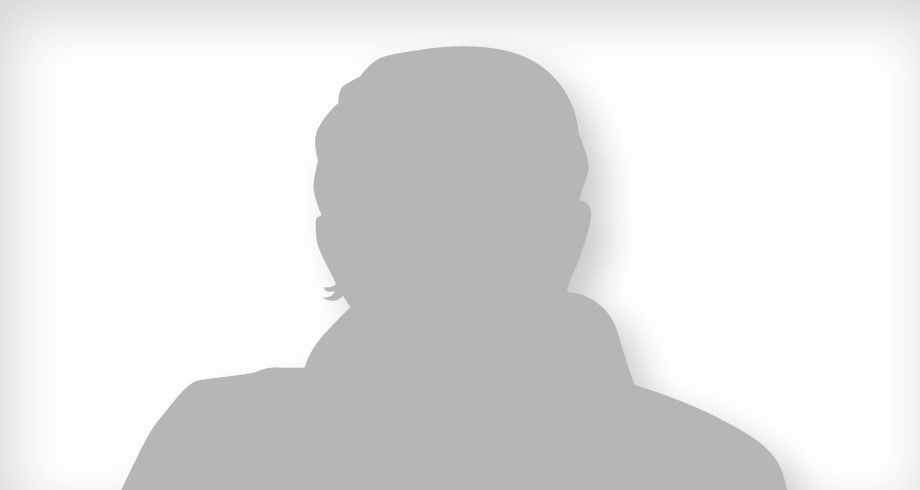
No wealth estimate, no sanctions.
Born in Omsk in 1950, and a graduate from the Sevastopol Higher Naval School with the rank of lieutenant, Ilya Traber served in the Soviet submarine fleet. In 1980, he left the navy to settle in Saint Petersburg (Leningrad at the time), where he worked as a bartender. At the end of the 1980s, he established himself as the biggest seller of antiques in the city, with a nickname that still haunts him: “Antiquarian”.
The Russian press has written extensively about his alleged links with the Petersburg mafia and his friendship with Vladimir Putin, who at the time headed the municipality's foreign relations department. At the end of the 1990s, Traber sat on the board of directors of the company in charge of operating the port of Saint Petersburg, which made him a key figure in this strategic entry and exit point to the city. He also has interests in a local oil company and in the port city of Vyborg at the border with Finland.
Threatened by mafia groups, he was forced to settle in Paris in an apartment with armoured windows. Later, he discreetly moved to Switzerland.
According to the Russian business daily Vedomosti, Ilya Traber now owns 100% of the coal terminal at the port of Ust-Luga. In 2015, his name was cited as part of a vast Spanish investigation into the Russian mafia initiated by Judge Baltasar Garzón, all of whose defendants were acquitted in 2018.
Links to Switzerland
- According to our information, Ilya Traber was domiciled in Switzerland in the mid-2000s. He had a B residence permit and personal tax arrangements.
- In 2006, he acquired a sumptuous property in La Tour-de-Peilz (Vaud): 6,000 m2 of living space and a 20-metre underground swimming pool, purchased from a Canadian singer for 32 million francs. In the basement of his villa, he then kept an astonishing collection of paintings.
- In 2015, as confirmed by the land register of the Canton of Vaud, he gifted this property to his wife Nina Menshikova. Traber now lives mostly in Saint Petersburg.
-
Iskander Makhmudov
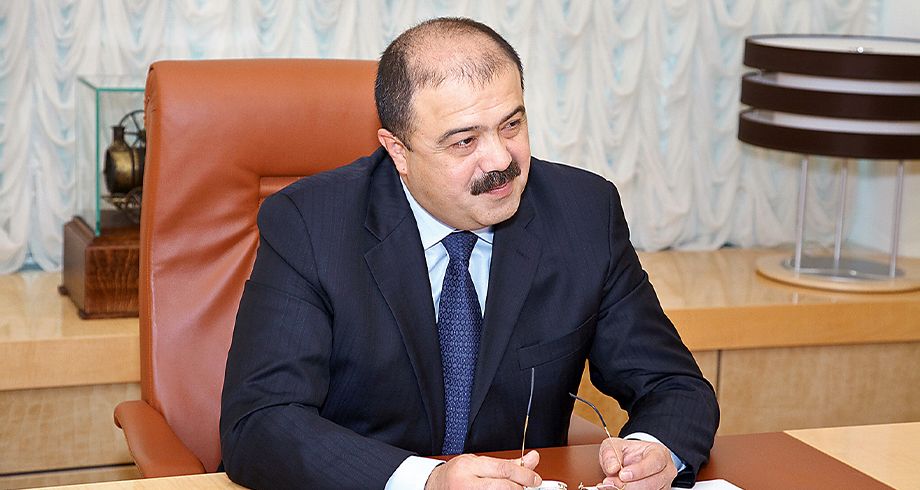 ©
Wikimedia
©
Wikimedia
USD 9.7 billion (Forbes 2021). No sanctions.
Born in 1963 in Bukhara, Uzbekistan, Iskander Makhmudov began his career in the late 1980s as an engineer and translator for Arabic, employed by the Ministry of Commerce for missions in Iraq and Libya. The young Uzbek has a good sense of business and, when the Soviet Union fell, he went to Moscow make his first moves in the TransWorld Group (TWG). The holding company of the legendary Chernoy brothers controlled the largest metallurgical factories in the country. Makhmudov then had as partners Oleg Deripaska, Vladimir Lisin and Alexander Abramov, all of whom became billionaires.
A survivor of the bloody aluminium wars (in which murders and hostile take-overs shook the sector), he was to take control of one of the largest copper and zinc producers in the country (together with one of the factory managers): Uralelectromed,. It is on this basis that the giant Ural Mining and Metallurgical Company (UGMK) was created, bringing together companies from the industrial, mining, non-ferrous metallurgy and mechanical engineering sectors. Makhmudov is also a shareholder, with his partner Andrey Bokarev, of Transmashholding (the largest supplier of railway rolling stock) and Kuzbassrazrezugol, the second biggest Russian coal producer. He is one of the “kings of state orders”, those who win all public contracts.
The troubled past of the oligarch resurfaces regularly. A Mediapart investigation recalls that he was charged with “illicit association” (with the criminal group Ismajlovskaya) and “money laundering” in the context of a procedure opened in Spain in 2007. The investigation finally got bogged down in Russia.
Partner of the French giant Alstom since 2011, Iskander Makhmudov takes care of his image as the big boss of industry in the service of the Kremlin. In 2002, he called himself “Putin's soldier”. He often sends his alter ego and partner Bokarev to one-on-one encounters with the master of the Kremlin. He himself was decorated by Vladimir Putin in 2018 with the Second Degree Medal of the Order for Merit to the Fatherland.
Links with Switzerland
- In May 2016, the Russian environmental opponent Konstantin Rubakhin, who fought against one of the ecocide projects of the giant UGMK in the Voronezh region, sent a report to the Prosecutor General of Switzerland to expose the criminal origin of the fortune of the Makhmudov-Bokarev duo. Public Eye is in possession of the letter then addressed to Prosecutor Michael Lauber - it never received a response.
- The activist described how UGMK accumulated its profits outside Russia, on behalf of trading companies in Switzerland – among others Alpin Group AG (Thun), Umcor AG in Zurich and GGP Metall AG in Biel – then how these funds were used to buy assets in Europe.
- According to an official document produced by Rubakhin, the giant Transmacshholding, owned by the Makhmudov-Bokarev duo, had bank accounts with Credit Suisse at the time.
- At the end of 2010, Transmashholding fell victim to scammers who stole 100 million euros from its account at LGT Bank in Geneva. The group of fraudsters went to trial in Bellinzona in 2021 – the case is ongoing.
-
Kirill Shamalov
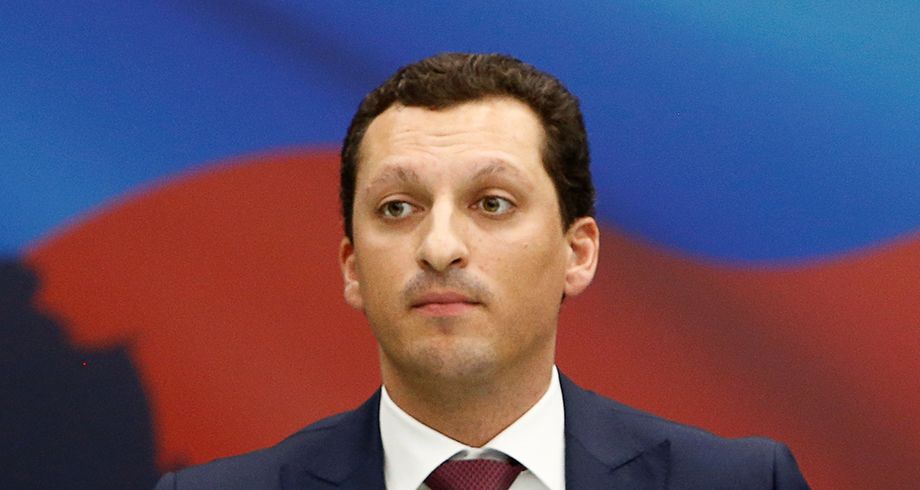 ©
Sergei Karpukhin / Reuters
©
Sergei Karpukhin / Reuters
USD 800 million (Forbes 2021). Under sanctions in the US, EU, UK, Switzerland, Australia, Canada, Japan and Ukraine.
Born in 1982 in Saint Petersburg, Kirill Shamalov is the son of former dentist Nikolai Shamalov, one of Vladimir Putin's oldest friends and a shareholder of Rossiya Bank as well as a former dacha companion.
Kirill’s career as a young oligarch seemed all mapped out. After studying law at the University of Saint Petersburg, he worked for the giant Gazprom and its Gazprombank, and then was appointed vice-president of the petrochemical group Sibur, in which he became a shareholder under very specific circumstances (see below).
In 2013, the dashing businessman, a rally enthusiast, married Katerina Tikhonova, the youngest daughter of the Russian president. The spouses bought themselves a luxurious villa in Biarritz which has recently been occupied by activists protesting against the war in Ukraine. Following the wedding, Shamalov junior was flooded with business proposals and managed several offshore companies registered in tax havens, as revealed by an OCCRP investigation based on leaked emails.
In 2013, he acquired, via one of his offshore companies, 3.8% of the capital of the giant Sibur, for the ridiculous price of USD 100 instead of 380 million dollars. A gift he is likely to have received for the wedding. The following year, thanks to a loan obtained from Gazprombank, he acquired an additional 17% of shares in Sibur, which then belonged to the oligarch Gennady Timchenko, the latter having just been placed under sanctions by the US. A stake he sold in 2017, six months before his divorce from Katerina Tikhonova.
Links with Switzerland
- The OCCRP investigation reveals that, during his union with Vladimir Putin‘s daughter, Kirill Shamalov held several bank accounts in Switzerland.
- According to several reports, Kirill Shamalov was also a client of Gazprombank, one of whose main subsidiaries is based in Zurich.
- After the “Panama Paper”” revelations, the Gazprombank subsidiary in Switzerland was investigated by FINMA. The federal financial market supervisory authority had noted serious shortcomings concerning the private clients of this institution, and prohibited Gazprombank (Suisse) SA in February 2018 from carrying out private wealth management.
-
Patriarch Kirill of Moscow
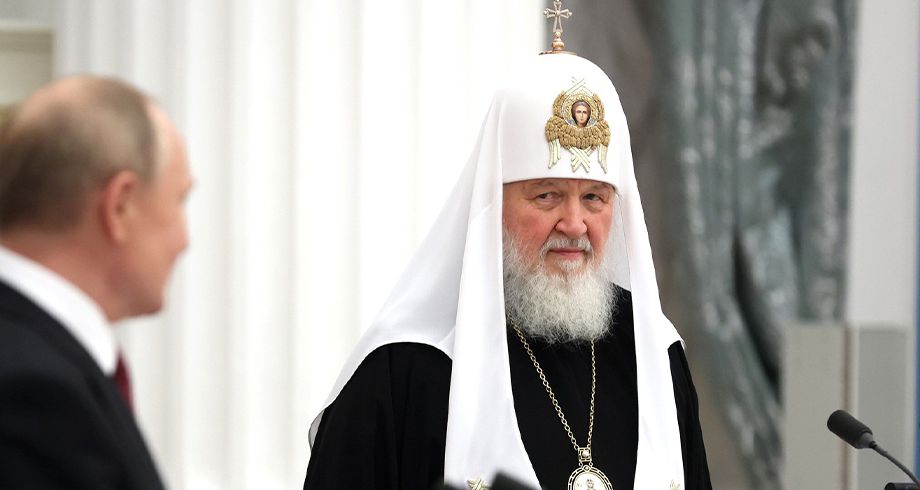 ©
Kremlin / Wikimedia
©
Kremlin / Wikimedia
Patriarch Kirill of Moscow and All Rus’ (Vladimir Gundyaev)
Fortune not listed. No Sanctions.
In Russia, Patriarch Kirill spearheads the fight for conservative, anti-LGBT and patriotic values. Born in 1946 in Saint Petersburg, Kirill has always given his unconditional support to the regime of Vladimir Putin, not hesitating to justify the police repression of opposition demonstrations or to bless the arms and wars waged by Moscow abroad. At the beginning of the invasion of Ukraine, he called all those who opposed the Russian military intervention “forces of evil”.
Historians with access to the KGB archives claim that Vladimir Gundyaev (his civil name) was a KGB agent in Soviet times, acting under the code name “Mikhailov”. Allegedly he became a spy during the 1970s, when he represented the patriarchy at the World Council of Churches (WCC) in Geneva.
In the 1990s, Gundyaev was in charge of the Moscow Patriarchate's foreign relations department, a position that would have allowed him to enrich himself by importing cigarettes - he then earned the nickname “Tobacco” - and in selling oil, according to several Russian media including Novaya Gazeta.
The Orthodox Church could engage in these trades, that were exempt from customs duties, under the flag of its charitable activities, which made it possible to reap huge profits.
After he had become patriarch in 2009, the clergyman's luxury tastes asserted themselves. He has allegedly amassed a huge fortune, with numerous real estate properties, including one in Switzerland, and a fondness for Swiss watches at more than CHF 50,000 each.
Links with Switzerland
- According to our information, Patriarch Kirill loves Switzerland, a country he discovered in the 1970s. He travelled there regularly before the war in Ukraine, incognito. In Geneva, a Russian-Italian family – a mother and her two sons –have been his main base in recent years. They organised medical appointments in private clinics or took him skiing, a hobby which he adores.
- According to Novaya Gazeta, he owns a chalet in Switzerland, gifted to him by a friend from Geneva.
- The Orthodox Foundation of the Patriarchate of Moscow, registered in Geneva, counts Mikhail Gundyaev amongst its members, a nephew of Patriarch Kirill who is also found in the Foundation of the Global Christian Forum in Versoix.
- In the 1990s, the opaque business of the Russian Orthodox Church largely passed through Switzerland. A money laundering investigation was opened in 1998 in Geneva against Vitali Kirillov, whose company RAO MES, which exported oil, was 40% owned by the financial and economic department of the patriarchate. This investigation was closed for lack of collaboration with the Russian authorities.
-
Leonid Mikhelson
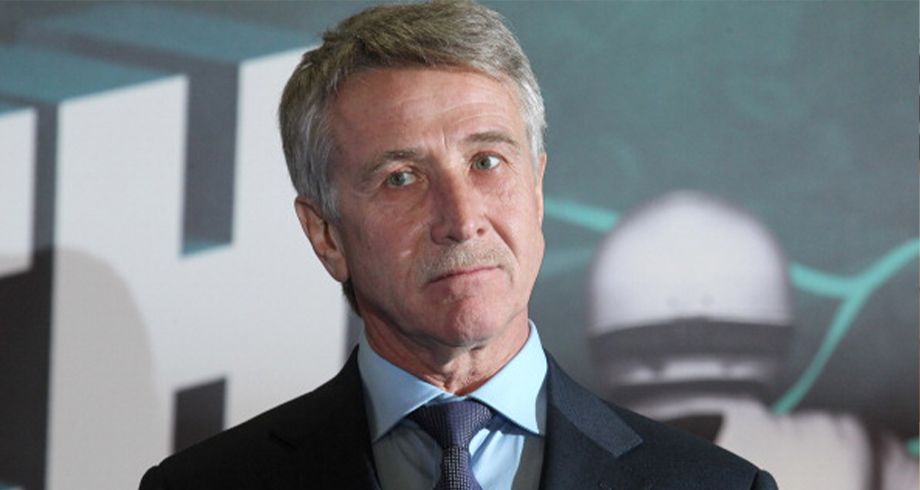 ©
Sasha Mordovets / Getty Images
©
Sasha Mordovets / Getty Images
USD 24.9 billion (Forbes 2021). Under sanctions in the UK, Canada, Australia and Ukraine. He participated in the meeting of entrepreneurs with Vladimir Putin in the Kremlin, 24 February 2022.
Leonid Mikhelson's career shows how important it is to have the right friends at the right time. Born in 1955 in Dagestan, the future oligarch plunged very early into the gas business. As soon as he graduated from university, he was sent to the far north of the Soviet Union to help build a gas pipeline. Then, at the end of the 1980s, he succeeded his father at the head of a work collective in charge of a gas pipeline. After the fall of the USSR, he managed to privatise this collective and it became Novatek, one of the few Russian gas distributors in private hands. To achieve such success, you need to have strong support. At the time, Mikhelson's partner in Novatek was the vice-governor of the Yamal region, where the company concentrated its activities.
In 2008, Mikhelson made a decisive encounter: Gennady Timchenko, Vladimir Putin's old friend from Saint Petersburg. The latter bought 5% of Novatek but, more importantly, introduced him to Alexey Miller, the CEO of Gazprom, also a trusted friend of Putin. From there, Novatek bought, in addition to its own fields, gas from Gazprom at a reduced price. In 2010, Mikhelson acquired 50% of Sibur, the Russian petrochemical giant (and, in 2017, an additional package of shares sold by Kirill Shamalov – the ex-husband of Vladimir Putin's daughter, Katerina Tikhonova). To finance this acquisition, the billionaire appealed to Gazprombank (the bank of the state gas giant) thanks to the precious introductions of Timchenko. Today, the two men are partners in Novatek (24.8% and 23.5% respectively) and Sibur (30.6% and 14.45%). In 2019, Mikhelson became the richest man in Russia.
Links with Switzerland
- Novatek Gas & Power in Zug, global oil and gas trading. In 2014, Novatek was placed under US sanctions, limiting access to the US capital market. Novatek Gas & Power Asia, also based in Zug, is a trading arm of Novatek in Asia.
- In 2011, Novatek's IPO was facilitated by UBS and US bank Morgan Stanley.
- Sibur Investments AG, the investment company for the oil group Sibur, is registered in Baar.
- In 2010, the acquisition by Mikhelson of 50% of the capital of Sibur was made via a company registered in Switzerland, Miracle, of which he was the beneficial owner through his shell structure Dellawood Holdings Ltd in the Bahamas (information contained in the Sibur audit in 2011).
- In 2021, Mark Gyetvay, the financial director of Novatek between 2005 and 2016, was arrested by American authorities. He was accused of tax evasion to the amount of USD 93 million, an amount he allegedly hid in Swiss bank accounts.
-
Oleg Deripaska
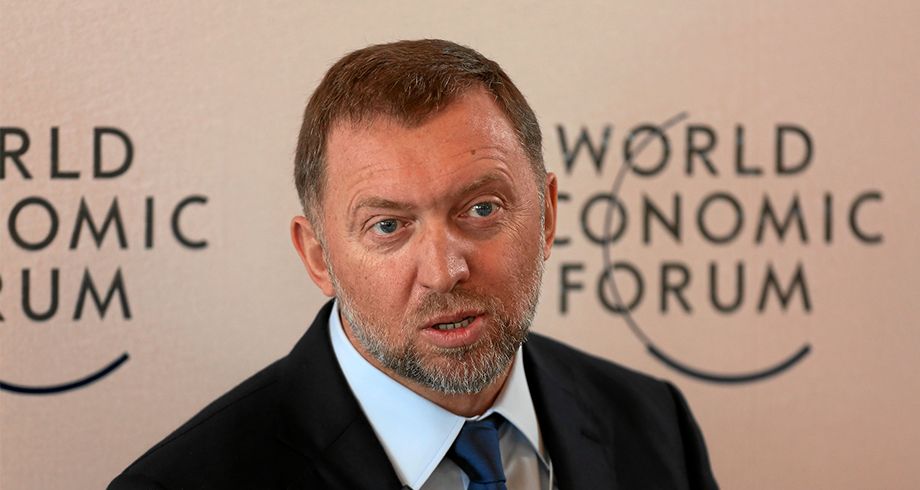 ©
Jolanda Flubacher / WEF
©
Jolanda Flubacher / WEF
USD 1.7 billion (Forbes 2021). Under sanctions in the EU, US, UK, Switzerland, Australia, Canada and Ukraine.
Despite the severe impact of the sanctions on his wealth, Oleg Deripaska is a heavyweight among the Russian oligarchs, and also one of the most prominent figures of this caste which, in normal times, prefers shadow to light. Born in 1968 in Dzerzhinsk near Moscow, he is the founder of Rusal, today the world's leading aluminium producer. This giant was created in 2006 from the merger of Rusal, Sual (owned by Viktor Vekselberg) and the aluminium assets held by Glencore.
In 2018, Deripaska was sanctioned by the United States due to his proximity with the Kremlin. The pugnacious billionaire then reached an agreement with the US Treasury to reduce the sanctions against his main holding company, EN+. He had agreed to reduce his share from 70% to 45% – the difference being held by the Russian state bank VTB and by a charitable foundation. The US authorities themselves have expressed serious doubts that the oligarch has truly relinquished effective control of his assets.
The oligarch has known many other episodes. In 2006, the United States cancelled his visa. In 2007, during a trial against two members of the Russian criminal network Izmailovo, he was presented as a supporter of this mafia. In 2010, the Spanish justice questioned him for suspicion of money laundering.
At the end of 2021, an investigation by Alexey Navalny's Anti-Corruption Fund revealed that Oleg Deripaska had, for years, financed the secret family of Russian Foreign Minister Sergey Lavrov. Lavrov's hidden mistress regularly used the oligarch's villas, jets and yachts. In exchange, the minister intervened in favour of Deripaska's business in the world. He even tried to overturn the visa ban in the United States.
Links with Switzerland
- Deripaska holds, through Rasperia Trading Limited, 27.8% of the Austrian construction company Strabag SE, which itself owns Strabag Switzerland.
- In recent years, Strabag has won several public construction contracts in Switzerland, such as the renovation of Winterthur station. After the Russian invasion in Ukraine, Strabag SE announced its intention to distance itself from the oligarch.
- Since the deal with the US Treasury (see above), Glencore has played a key role in the management of Deripaska's assets: the oligarch has kept 35% of EN+'s voting rights while Glencore holds 10.55% and the Russian state bank VTB 7.35%.
- Rusal Products GmbH, the trading arm of the group, is located in Zug, together with Rusal Marketing GmbH.
-
Petr Aven
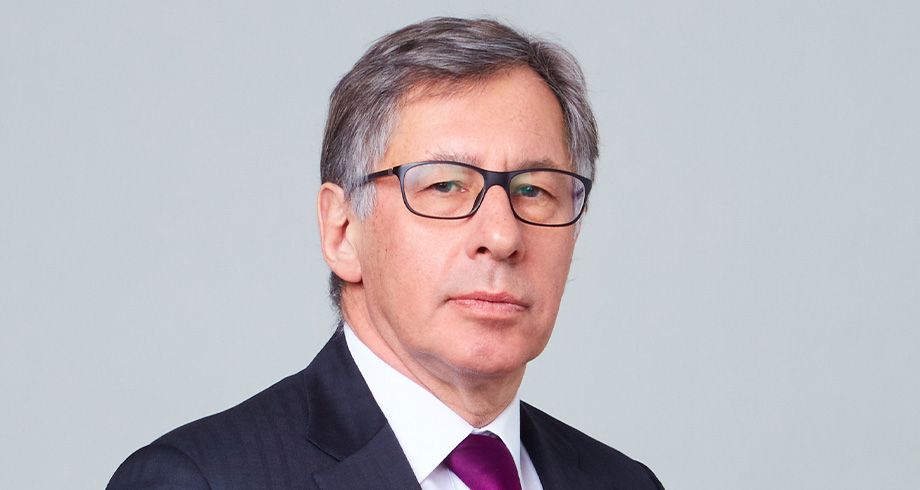 ©
Alfa Bank Russia
©
Alfa Bank Russia
USD 5.3 billion (Forbes 2021) Under sanctions in the EU, UK, Switzerland, Canada, Australia and Ukraine. Present at the meeting of the oligarchs with Vladimir Putin on 24 February in the Kremlin.
Born in 1955 in Moscow, Petr Aven, a mathematician by profession, began his career as a minister. In 1992, as an ardent supporterof Russia’s transition to a market economy, he took helm of the brand new Ministry of Foreign Trade, thereby creating an important network among the country's entrepreneurs. In 1994, he became the majority shareholder of Alpha Bank, founded a year earlier by his partner Mikhail Fridman. The two men would never leave each other. Their bank became the first private financial institution in the country and, in 2013, they registered LetterOne Holdings in Luxembourg, an investment group which has its offices in London and holds interests of up to USD 23 billion in energy, telecommunications, health and retail. Today, their assets in this fund are frozen and they will not be able to receive dividends.
The excellent relationship that Petr Aven has with Vladimir Putin dates back to the 1990s. At the head of the external relations committee of Saint Petersburg, the future president was caught up in an embarrassing affair. A commission of inquiry from the local parliament accused him of embezzlement for his role in a vast barter operation, which was supposed to supply the city with food that was in short supply. The deal was to export petroleum products and metals, in exchange for food products which only arrived in small quantities, but a lot of money was siphoned off. Petr Aven, Minister of Foreign Trade at the time, rushed to the aid of Putin and the investigation failed.
An ardent collector of Russian avant-garde painting from the beginning of the 20th century, the billionaire is also close to Igor Sechin, the all-powerful boss of the oil giant Rosneft.
Links with Switzerland
- Aven holds, via LetterOne, shares in Wintershall Dea, a German energy group which has a branch in Zug – Wintershall Dea Schweiz AG (formerly Wintershall Oil AG) – and was to finance the Nord Stream 2 gas pipeline to the amount of one billion euros, a project abandoned in early March.
- The billionaire is believed to own a luxurious apartment located on a golf course with a view of the snow-capped peaks of the Bernese Oberland. This property would have been seized in March 2022 as a result of the sanctions, according to several Swiss media.
-
Roman Abramovich
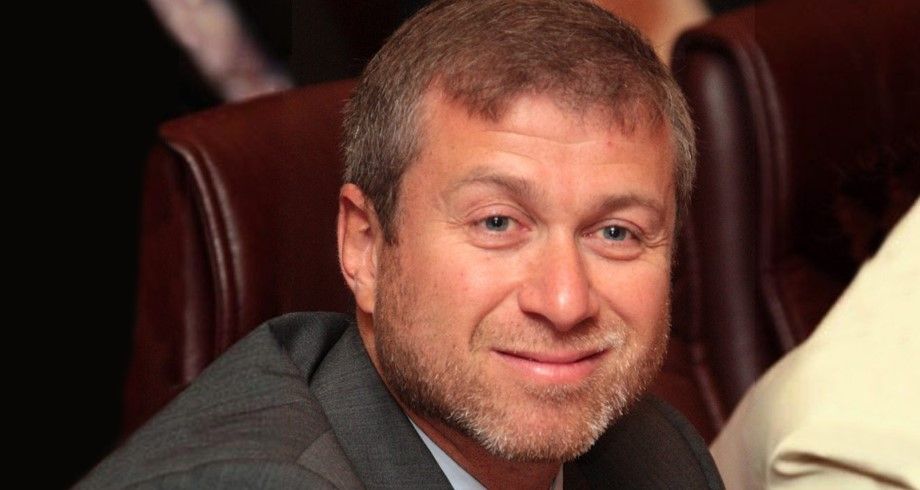 ©
Marina Lystseva / Wikimedia
©
Marina Lystseva / Wikimedia
USD 14.5 billion (Forbes 2021). Under sanctions in the EU, Switzerland, UK, Canada and Australia.
Born in 1966 in Saratov, Roman Abramovich, owner of the Chelsea football club in London until the sale to the Swiss Hansjörg Wyss at the end of April, is one of the key figures of the Russian elite of the 1990s, well known in and outside the country. He belongs to the small group of oligarchs who financed the re-election in 1996 of President Boris Yeltsin, sick and alcoholic at the time. Back then, the Russian state, on the verge of bankruptcy, auctioned off stakes in the country's most lucrative companies in exchange for loans. This is how Abramovich joined the ranks of shareholders of the oil company Sibneft. In 2005, Sibneft was sold to Gazprom (becoming Gazpromneft), allowing the oligarch to pocket USD 13 billion. It was on the basis of this fortune that the steel giant Evraz, of which Abramovich then held 57.5%, was able to continue to prosper.
To maintain his status as an oligarch, Abramovich (holder of Russian, Israeli and Portuguese passports) had to contribute to the political projects of Vladimir Putin. Elected governor of Chukotka in 2000, he had to invest billions of rubles in this very poor region in the far northeast of Russia. Admittedly, the billionaire was not short of cash, since he then controlled Highland Gold, one of the major gold producers with mines in Chukotka, sold in 2020 for USD 1.4 billion. Abramovich also offloaded a billion dollars in Skolkovo, the flagship project of a Russian Silicon Valley then promoted by Dmitry Medvedev, president at the time. Until 2019, the billionaire also owned, jointly with the Russian state, the Perviy Kanal television channel, the Kremlin's main propaganda machine. His links with power are numerous and well documented.
In 2019, anticipating possible sanctions, Abramovich sold part of his shares in Evraz in order to reduce his stake below 50%. He is now seeking to save his reputation by participating in peace negotiations between Ukraine and Russia.
Links with Switzerland
- East Metals AG, the trading arm of Evraz Group, is located in Zug. According to information of Public Eye, East Metals AG manages large quantities for Evraz, in particular palladium. In 2020, Evraz launched a research and development centre in Zug for the use of vanadium, a rare metal.
- East Metals AG director Margaryta Zvyezda is also a board member of the Zug Commodity Association, the traders' lobby.
- A New York Times investigation reveals that Credit Suisse was in business with one of the oligarch's investment companies, Concord Management, and introduced it to US hedge funds in an attempt to hide the real source of funds.
- His application for a residence permiet in Verbier was refused in 2018 by the Federal Police, which highlighted a danger to the security and reputation of Switzerland, citing allegations of money laundering and contacts with criminal organisations.
- During the 1990s, Sibneft (the future oil arm of Gazprom) was already using Switzerland for oil trading with its company Runicom AG, registered in Fribourg, owned by Abramovich. In 2018, Runicom's debt with the European Development Bank was brought before a Friborg court but eventually resolved in an out-of-court agreement.
-
Suleyman Kerimov
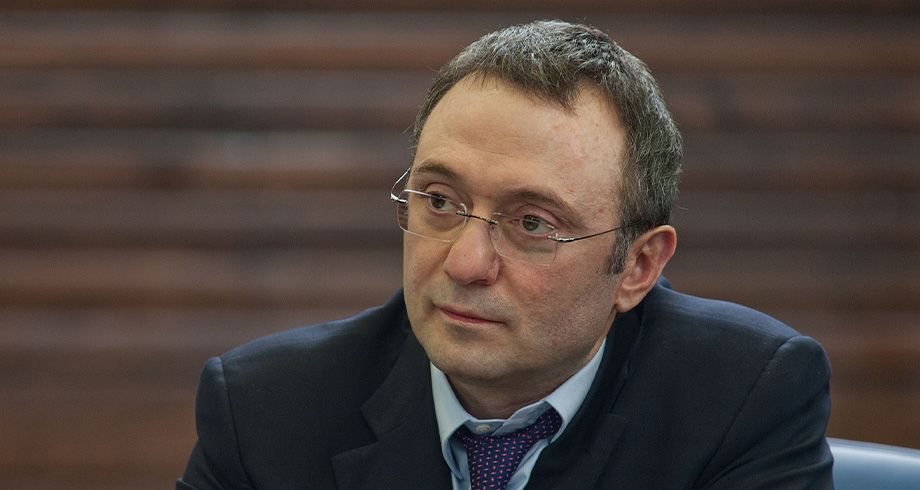 ©
Wikimedia
©
Wikimedia
USD 15.8 billion (Forbes 2021). Under sanctions in the US, EU, UK, Switzerland, Australia, Canada, Japan and Ukraine. Present at the meeting with Vladimir Putin in the Kremlin on 24 February 2022.
At 57, Suleyman Kerimov, who survived a serious Ferrari accident on the French Riviera in 2006, is often referred to as “the richest senior official in Russia”. Since 2008, he has been a senator in the Federation Council (the upper house of the Russian parliament) within the United Russia group (the pro-Putin party) for Dagestan, where he is from. Officially, he left the business. In the mid-2000s, he held 4.5% of the giant Gazprom, 6% of Sberbank and 25% of the giant Uralkali (a potash producer) bought from Dmitry Rybolovlev, a former Geneva resident. All of these holdings have been sold. His family – including his son Saïd, placed under Swiss sanctions on 22 April 2022 – controls 76.3% of the leading Russian gold producer Polyus as well as the airport of Makhachkala in Dagestan.
In 2017, Kerimov was arrested at Nice airport, as he got off his private jet, and charged with money laundering and complicity in serious tax evasion. French justice suspects him of having acquired several prestigious villas in Cap d'Antibes via front companies controlled by a Swiss limited company: Swiru Holding. His responsibility could not be proven and the case ended in 2020 with the signing of a judicial agreement in the public interest (CJIP) by which the Swiss structure agreed to pay a fine of EUR 1.4 million. euros in addition to a tax adjustment of 10.3 million.
Since 2011, Kerimov has owned the football club FK Anzhi Makhachkala in Dagestan.
Links with Switzerland
- His charitable foundation, the Suleyman Kerimov Foundation, was registered in Lucerne in 2007, renamed the Human Diversity Foundation in 2019. The charity’s old website is gone and with it the annual reports that detailed donations made up to 2016. Since April 2022, the charity is in liquidation.
- In 2013, Kerimov announced that he had transferred his assets to his Swiss foundation. Thanks to this philanthropic gesture, as reported by the Russian press, the oligarch was able to preserve his position as senator, by agreeing to a new law which prohibits elected officials and civil servants from having funds abroad.
- The annual reports of the Suleyman Kerimov Foundation, of which Public Eye is in possession, show that between 2007 and 2016, this Swiss structure distributed the staggering sum of CHF 464.2 million, mainly for projects in Russia: construction of schools, mosques and medical programmes. It is difficult, if not impossible, to verify whether these sums have indeed gone to the announced projects. Only a few million francs in donations were made in Switzerland, benefiting the Zurich Film Festival in particular.
- The president of this foundation, the Swiss businessman Alexander Studhalter, is also the director of the company Swiru Holding, which was pinned down by French justice. This structure based in Lucerne was renamed Alstone Investment AG in 2021. According to a recent BBC investigation, Studhalter is the main organiser of the offshore empire of the oligarch Kerimov.
-
Vagit Alekperov
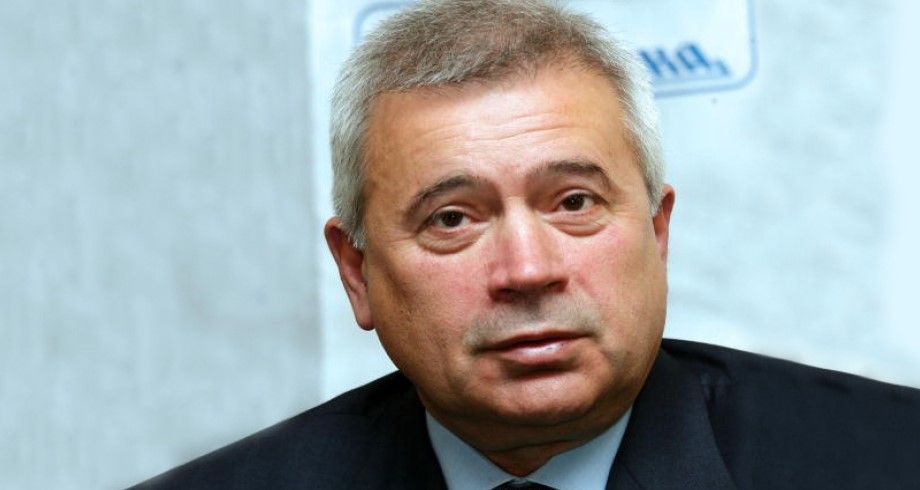 ©
Dmitry Beliakov/ Bloomberg via Getty Images
©
Dmitry Beliakov/ Bloomberg via Getty Images
USD 24.9 billion (Forbes 2021). Under sanctions in the UK, Australia and Ukraine. Present at the meeting with Vladimir Putin in the Kremlin on 24 February 2022.
Born in 1950 in Baku, Azerbaijan, Vagit Alekperov was once Deputy Minister of Oil in the USSR and is now the main shareholder of Lukoil, the largest private oil company in Russia. In the early 1990s, thanks to his links with President Boris Yeltsin, he joined the shareholders of the future oil giant that was created on the basis of three privatised oil fields in the Khanty-Mansiysk region. This group then swallowed up other assets in Siberia, the Urals and the Volga region, establishing itself as the only independent company capable of competing with the state giant Rosneft. Lukoil, which is listed on the stock exchange, employs 100,000 people.
Unlike the oil magnate Mikhail Khodorkovsky, who had political ambitions, Vagit Alekperov, nicknamed “the General”, has always known how to stay in his place. Alekperov adapted perfectly to the power vertical imposed by Vladimir Putin. The independent Russian press reports that in 2016 he acquired, via a front company, 36 hectares of land of former vineyards in Crimea, which was annexed two years earlier by Russia.
In 2013, the oil tycoon and passionate collector of old coins, bequeathed his shares of 28.3% to his son Yusuf, on the condition that the latter did not have the right to sell or break up this stake. In 2020, Lukoil earned the Alekperov family USD 1.1 billion in dividends.
Following the sanctions in 2022, Alekperov resigned as chairman and member of the board of directors of Lukoil.
Links with Switzerland
- The trading branch of the giant Lukoil, Litasco SA, was registered in Geneva in 2000. It trades in more than 80 countries. It now sells 3.8 million barrels a day, ranking second among the biggest buyers of Russian oil, according to the Forbes 2020 ranking.
- In 2017, Alekperov said he wanted to sell this Swiss subsidiary. Reuters specified that this project (which was never carried out) was linked to the US sanctions imposed after the annexation of Crimea by Russia, which made it more difficult to finance oil transactions in dollars.
- The private bank Pictet has long maintained excellent relations with the leaders of Lukoil and, according to our information, Vagit Alekperov once had his accounts there.
- From 2012 to 2019, Ivan Pictet, former senior partner of the bank, was a member of Lukoil's board of directors. According to several sources, he is also a personal friend of Alekperov.
- Two subsidiaries of Lukoil are registered in Switzerland: LUKOIL Accounting and Finance Europe s.r.o., Prague, Geneva branch, and LUKOIL Technology Services GmbH, Wien, Zweigniederlassung Schweiz (Opfikon)
- Eiger Shipping AG: the transport company of Lukoil (and subsidiary of Litasco) was registered in Switzerland in 2007.
-
Vasily Anisimov
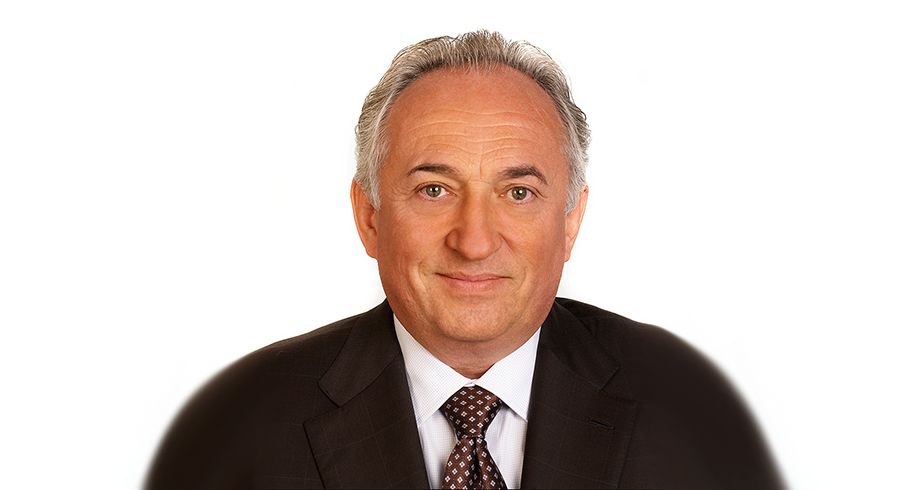 ©
Wikimedia
©
Wikimedia
USD 1.7 billion (Forbes 2021). Not sanctioned.
Born in 1951 in the territory of what is now Kazakhstan, Vasily Anisimov is one of the oligarchs who made their first fortune by selling commodities on the global market which they obtained at reduced prices from state companies thanks to their privileged contacts. After the fall of the USSR, he created Trustconsult, a company specialising in the aluminium trade and the purchase of foundries. In 1994, these assets were united within Coalco (the company was registered in Zug the same year). Six years later, after a conflict with oil magnate Mikhail Khodorkovsky, this structure was sold to Viktor Vekselberg's Renova Group.
The proceeds from this sale were partly invested in the giant Metalloinvest, whose majority shareholders are Alisher Usmanov and Vladimir Skoch. The oligarch also invested in real estate via a company - also called Coalco - which manages 20,000 hectares of land in the Moscow region, particularly in the village of Akulinino, where Vladimir Yakunin and Arkady Rotenberg, relatives of Vladimir Putin, lived.
In 2010, Anisimov became president of the Russian Judo Federation, a sport he had never been interested in before. The fact that Vladimir Putin is a great fan of it may have encouraged him to take on this role, as well as the fact that Arkady Rotenberg is the vice-president of the federation.
Links with Switzerland
- As early as 2007, Anisimov took up residence in the canton of Zurich, although at the time he spent most of his time in Russia and the United States. At the time, he built a luxurious villa in Küsnacht.
- His ex-wife Ekaterina is still domiciled in Küsnacht. She obtained a court order prohibiting the taking of photos of the property. In March 2022, Alina Kabaeva, Putin's mistress, and her four children may have stayed in her house, as told by the Swiss online magazine Republik, which investigated these rumours.
- The billionaire now lives, at least officially, in the canton of Schwyz. He moved there following the abolition in 2010 of flat-rate taxation in the canton of Zurich.
- Ekaterina Anisimova is president of a foundation in Zurich, the World & Education Fondation, whose goal is the “promotion of equal opportunities for children, young people and adults, in particular from immigrant families, binational couples or with immigrant background”. No further information on the activities of the foundation is available.
- Anisimov's activities have left their mark in Zug: 13 Coalco subsidiary companies are registered there, all in liquidation (the most recent closed in May 2021).
-
Viktor Rashnikov & daughters
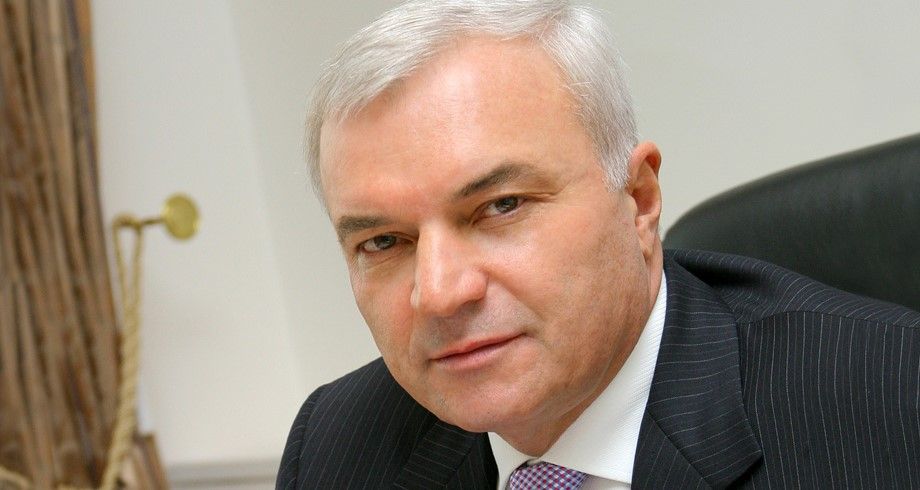 ©
Wikimedia
©
Wikimedia
USD 11.2 billion (Forbes 2021). Under sanctions in the EU, UK, Switzerland, Australia and Ukraine.
Born in 1948 in the Urals, Viktor Rachnikov rose through the ranks of the Magnitogorsk Metallurgical Company (MMK), in which he now holds 79.76% of the capital. Between 1967 and 1997, he rose from the position of mechanic to that of general manager. Then, when the juggernaut and pride of the USSR was privatised, Rashnikov established himself as its main shareholder. Thanks to strong political support in Moscow – and a few sleights of hand that made it possible to harm minority shareholders.
During the presidential elections of 2000, the billionaire actively supported the candidacy of Vladimir Putin. Alongside his business, he had been for several decades a deputy of the parliament of the Chelyabinsk region, of which he was the strongman. In 2003 and 2007, he was elected to the State Duma (the lower house of parliament) under the colours of United Russia, each time he renounced his mandate and therefore helped the pro-Putin party to win a seat.
The metallurgist is very popular with Putin, who frequently receives him in the Kremlin and regularly goes to the MMK recreation centre for skiing.
At the height of his power, Rashnikov prepared his succession. In 2012, he brought his youngest daughter onto the board of directors of MMK, while his eldest daughter is in charge of marketing, from Switzerland, the products of the heavy environmental polluter that is MMK.
On 3 March 2022, i.e. twelve days before the European Union imposed sanctions, MMK's shareholding structure was modified. Viktor Rashnikov transferred 79.76% of the shares he held through the Cypriot company Mintha Holding Limited to Altair LLC, an entity registered in Magnitogorsk. A way to protect its assets, note the Russian media.
MMK exports approximately 8% of its production to Europe and the United States, and its only overseas asset is a factory in Turkey.
Links with Switzerland
- The commercial arm of the steel giant, MMK Trading AG, moved to Zug in 2002. Tatiana Rakhno, the oligarch's eldest daughter, runs this subsidiary. Through this entity, the parent company exports a large part of its production.
- In 2020, according to internal documents consulted by Public Eye, two contracts worth USD 2.4 billion and two others worth EUR 480 million were signed between MMK Trading AG and the parent company MMK. They relate to the delivery of more than 10 million tonnes of metallurgical products until June 2023.
- Tatiana Rakhno, who is resident in Switzerland, is also the chairman of the board of directors of Uniprom AG, registered in Zug in 2011.
- Another subsidiary of the oligarch's group, MMK Steel Trade AG, is present in Lugano. In 2020, two contracts worth USD 540 million and EUR 480 million were signed between this entity and MMK, for the delivery of 2.65 million tonnes of metallurgical products until June 2023.
- Olga Rashnikova, the youngest daughter, has been a member of the MMK Board of Directors since 2012. She completed her secondary education at Franklin University Switzerland in Lugano.
-
Viktor Vekselberg
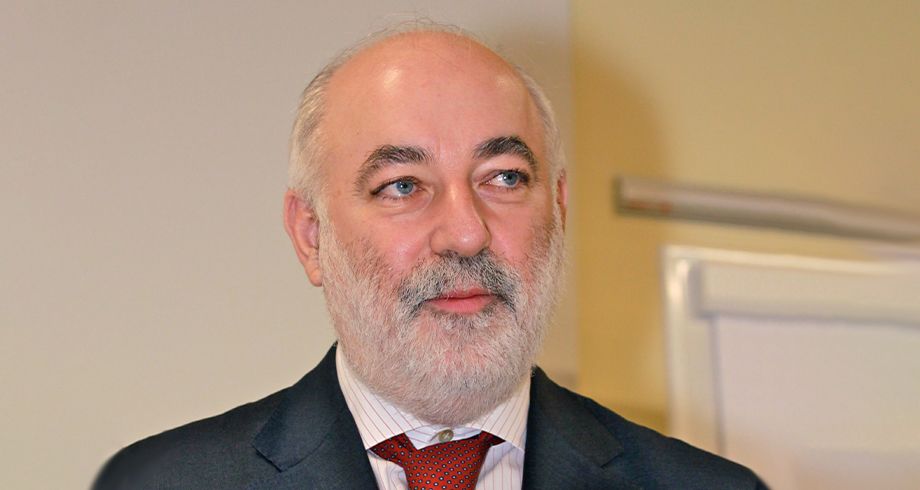 ©
Wikimedia
©
Wikimedia
USD 9 billion (Forbes 2021). Under sanctions in the US, UK, Canada, Australia, Japan and Ukraine.
Born in 1957 in Ukraine in the Lviv region, Viktor Vekselberg began his career in aluminium, in partnership with Oleg Deripaska, before turning to oil in 1997 with the takeover of the oil company Tyumen Oil Company (TNK). The alliance with British Petroleum allowed him to increase the worth of this asset and sell it in 2013 to the state giant Rosneft for USD 55 billion. Of this sum, the oligarch received USD 7 billion – which is proof of his good relations with the Putin regime.
Vekselberg is now the head of Renova Group, a conglomerate with interests in the oil, metals and telecommunications sector.
In 2010, at the request of Dmitry Medvedev, who then occupied the presidential chair, he joined the Skolkovo Foundation, a Russian Silicon Valley project launched a year earlier. His fortune allowed him to acquire the largest collection of Fabergé eggs in the world and to buy himself a Cypriot passport - all through Lamesa Group Inc., another holding company based in the British Virgin Islands, which also owns the shares of Vekselberg in the Swiss real estate company Züblin.
It must be said that Vekselberg knows about opaque structures: Already sanctioned in 2018 by the US for his proximity to power, Viktor Vekselberg that same year set up a blueprint how to escape sanctions. Renova Group, his main investment company, was then divided into three shell companies: Liwet, Witel and Tiwel, all domiciled at the same address in Zurich. Viktor Vekselberg's stake in each of these three entities is minority, just below the 50% limit that would trigger the sanctions.
But his strategy only had moderate success: at the end of 2020, the oligarch admitted that USD 1.5 billion was blocked in Swiss accounts. In December 2018, PostFinance had decided to close two accounts of Mr Vekselberg due to US sanctions. In February 2022, three weeks before the Russian invasion of Ukraine, the Swiss Federal Court ruled in favour of a complaint filed by Vekselberg against the closure of accounts.
Links with Switzerland
- Viktor Vekselberg holds shares in industrial company Sulzer (48.8%), precision tool producer Medmix (40.5%), technology conglomerate OC Oerlikon (41.4%), metallurgical company Swiss Steel Group (16.6%, formerly Schmolz + Bickenbach) as well as the real estate company Züblin Immobilien Holding (41.7%).
- The freezing of assets resulting from the sanctions imposed by the US showed that Vekselberg was among the biggest clients of Credit Suisse, UBS and Julius Baer.
- Despite the reorganisation of Renova's capital after the sanctions imposed in 2018, Vekselberg's holding companies remain rooted in Zurich: Liwet Holding AG, Witel AG and Tiwel Holding AG have taken over the tasks of Renova Management AG. Another company registered at the same address, Elwit Holding AG, was created in 2017 to hold the shares Vekselberg bought in Schmolz + Bickenbach.
- Viktor Vekselberg is domiciled in Zug, where he moved when Zurich – his previous domicile – abolished the flat-tax system. Authorities in both cantons suspected that his residence was only fictitious.
-
Viacheslav Moshe Kantor
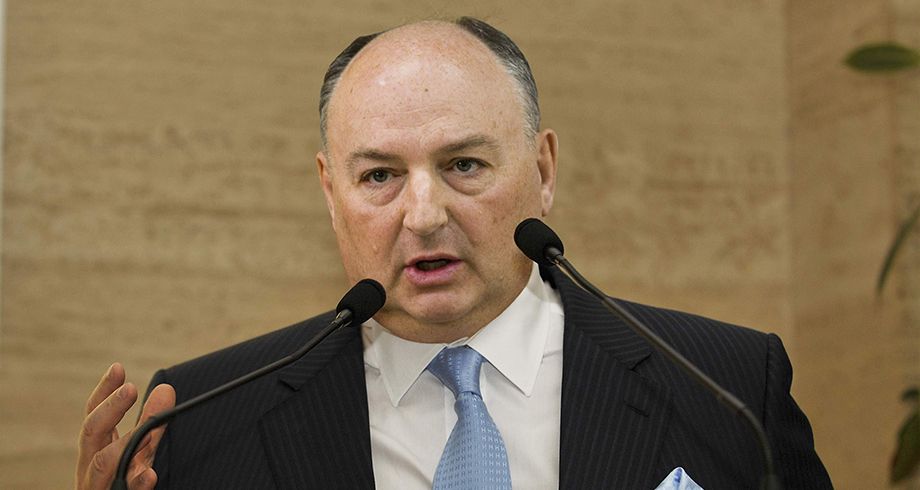 ©
Wikimedia
©
Wikimedia
USD 4.5 billion (Forbes 2021). Under sanctions in the EU, UK, Switzerland and Ukraine.
Born in 1953 in Moscow, Viacheslav Kantor has Russian, Israeli and British nationalities. Like many businessmen, he started in the sale of computers and then, in the 1990s, he established himself as the most powerful oligarch in the Russian agrochemical sector. Thanks to his good contacts in Moscow and to the local governor, he took control of one of the main mineral fertiliser factories, in Velikiy Novgorod. It is on this basis that he founded the Akron group, of which he holds 94.2% of the shares. The company ranks among the top ten fertiliser producers in the world.
Today, the wealthy businessman lives most of the time in London and prefers to talk about his socio-cultural activities. Through the European Jewish Fund, Kantor worked to strengthen Judaic culture and tradition as well as the fight against anti-Semitism. In the aftermath of the sanctions in April 2022, he resigned as president of the European Jewish Congress, which he had held since 2007.
In Moscow, he opened the Museum of Avant-garde Art (MAGMA) based on his fantastic collection of art, part of which had been exhibited in Geneva in 2009 at the Palais des Nations.
Although he does not belong to the first circle of oligarchs close to Putin, Kantor has always been loyal to the regime. In January 2017, the President presented him with the Order of Honour “in recognition of his professional achievements and longstanding fair work”.
Links with Switzerland
- Viacheslav Kantor lived from 1993 to 2017 in Switzerland with his wife and two children.
- According to the Geneva land register, he still owns a large property in Cologny on Chemin de Ruth which had once caused a stir: His neighbour Klaus Schwab, the founder of the World Economic Forum in Davos, had unsuccessfully opposed the pharaonic works Kantor planned for his property: the construction of a villa (with indoor swimming pool, underground garage and an access tunnel to the garden) and a separate building to host his art gallery (405 m2).
- From 1994 to 2009, the Geneva company Fimochim SA acted as a service company for his Akron group.
- His son, Vladimir, who co-directs the Akron company, studied at the International School of Geneva, then at the Ecole hôtelière de Lausanne. At the end of his studies, he had an internship at Credit Suisse.
-
Vladimir Lisin
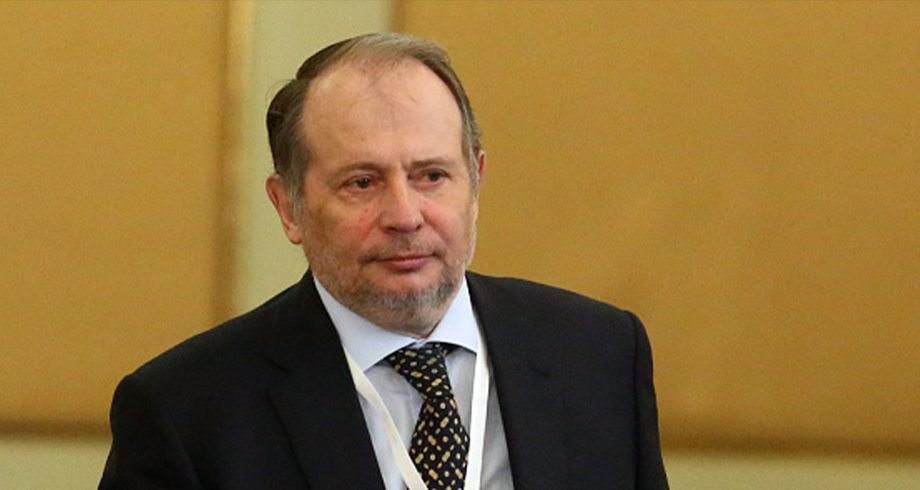 ©
Sasha Mordovets / Getty Images
©
Sasha Mordovets / Getty Images
USD 26.2 billion (Forbes 2021). CAATSA list in the United States. Under sanctions in Australia and Ukraine.
Born in 1956 in Ivanovo, the steel baron Vladimir Lisin – from lisa which means fox in Russian – is one of the most discreet men of his generation. His official biography points out that, endowed with an unshakeable will, he started at the bottom of the ladder as a specialised worker in the Tula metallurgical plant. Having become deputy director of the Karaganda metallurgical plant, he worked under the orders of Oleg Soskovets, who in 1993 would become Boris Yeltsin's very influential deputy prime minister.
Having moved to Moscow that year, Lisin joined the ranks of the TransWorld Group (TWG). Its owners, the legendary brothers Lev and Mikhail Chernoy, suspected of links with organised crime, also benefitted from the protection of the Minister Soskovets. TWG at the time controlled, via a gigantic network of offshore companies, the main metallurgy factories of the country. At the time, a series of settlings of scores and murders shook the sector. Two other future billionaires, Iskander Makhmudov and Oleg Deripaska, cut their teeth there. The Chernoy empire ended up being dismantled. Vladimir Lisin took the opportunity to take control of a prime asset: NLMK, the Novolipetsk metallurgical company, of which he now holds 79% of the shares.
A great lover of Cuban cigars and hunting, Lisin chairs the International Shooting Sports Federation (ISSF), based in Lausanne, and the Russian Shooting Union. He never expressed the slightest reservation vis-à-vis the Kremlin, and those who met him know his admiration for Putin. The president has trained several times in the large clay pigeon shooting centre that the oligarch opened in Moscow. Today, he pretends to distance himself from power. He was one of the first billionaires to call the war in Ukraine a “huge tragedy” that cannot be justified.
Links with Switzerland
- Lugano is home to NLMK Trading SA, the trading arm of NLMK, formerly Novex Trading (Swiss) S.A.
- Vladimir Lisin has been visiting Switzerland regularly for three decades, where one of his sons studied at the Collègue du Léman. According to our information, a Geneva lawyer named Alain B. manages part of his wealth with a Russian based in Cyprus, Stanislav B. Hundreds of millions of dollars have allegedly been placed in several private institutions in the area. (Pictet, Lombard and Julius Baer).
- In Geneva, a wealth management consulting firm – Le Lac Assets Management Sàrl – was registered by the Geneva lawyer Alain B.
- As Gotham City recently reported, citing Corriere della Sera, Vladimir Lisin is a shareholder of NLMK through the company Fletcher Group Holdings in which his son Youri holds a small share (4.6%). Fletcher Group Holdings is held indirectly through a Luxembourg company, Riskinvest Holding, whose declared beneficiary in the Commercial Register is the Geneva lawyer Alain B.
-
Vladimir Potanin
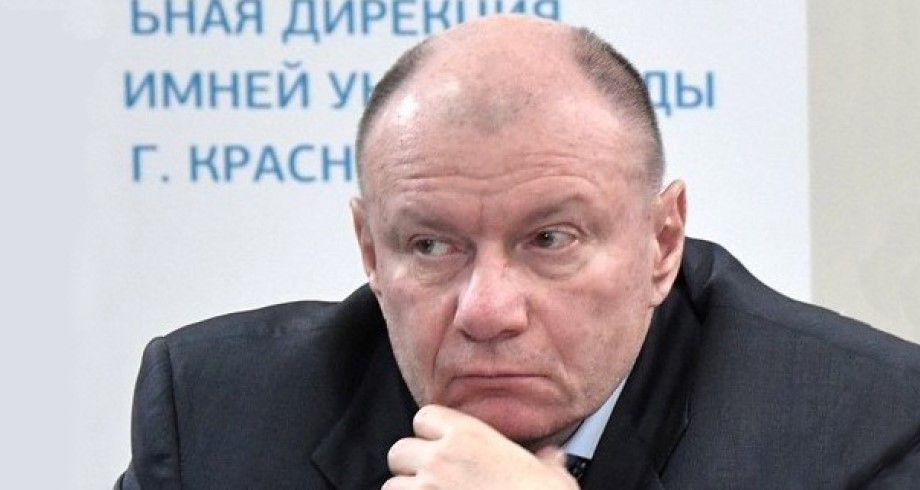 ©
www.kremlin.ru / Wikimedia
©
www.kremlin.ru / Wikimedia
USD 27 billion (Forbes 2021). Under sanctions in Australia, Canada and Ukraine. Present at the meeting with Vladimir Putin on 24 February 2022.
A member of the Communist Party during Soviet times and an official at the Ministry of Foreign Trade, Vladimir Potanin donned his banking costume in the mid-1990s. Co-founder of Unexim Bank, he is one of the initiators of the controversial “loans for shares” scheme. The Russian state was on the verge of bankruptcy and obtained loans from private banks, pledging stakes in the country's most lucrative state companies, which ultimately fell into the hands of the oligarchs. Potanin and his partners then acquired control of Norilsk Nickel for the equivalent of 170 million dollars, when the turnover of the nickel and palladium giant was 3 billion. The giant company now globally produces around 5% of nickel, a key component of electric vehicle batteries, and some 40% of palladium, which is used in the manufacture of catalytic converters and semiconductors.
As soon as Putin came to power in 2000, the oligarch, who owned 35% of Norilsk Nickel through his holding company Interros, pledged allegiance to the regime by financing the United Russia party. He is one of the initiators and donors of the Sochi Winter Olympics, the triumphant Putin show. A ski enthusiast, Potanin did not hesitate to take USD 1.7 billion out of his pocket for the development of the Rosa Khutor ski area, a sort of Russian Courchevel.
In May 2020, one of the worst environmental disasters occurred at a thermal plant belonging to NTEK, the energy subsidiary of Norilsk on the Taimyr Peninsula. More than 21,000 tonnes of diesel spilled into two rivers in the Far North of Siberia, polluting the very fragile environment of the tundra, where indigenous peoples still live partly by fishing and hunting. In March 2021, Nornickel paid a record fine of 147.8 billion roubles (CHF 1.9 billion) imposed by the Russian Environmental Monitoring Agency.
Links with Switzerland
- Metal Trade Overseas SA was registered in Zug in 2002. It is through this subsidiary that Nornickel sells its products to Europe, Asia, China and the United States. See our investigation.
- Between 2010 and 2012, Vladimir Potanin and his enemy partner Oleg Deripaska clashed in Swiss courts for control of Norilsk Nickel.
- Norilsk Nickel has invested in the Swiss platform Atomyze AG (Zug), a developer of blockchain technology. It is therefore the first industrial group to offer its assets to be bought via cryptomoney.
- In the mid-1990s, Vladimir Potanin achieved the feat of opening a subsidiary of his bank Unexim in Geneva, when Credit Suisse was the first institution to obtain the right to set up in Moscow. Potanin has retained many contacts in Switzerland from this period.
-
Vladimir Yakunin
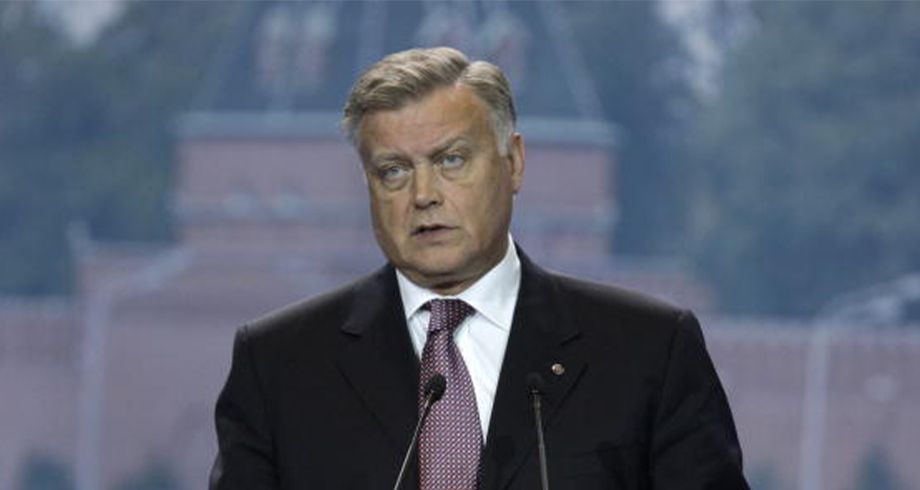 ©
Alexander Zemlianichenko / Bloomberg
©
Alexander Zemlianichenko / Bloomberg
USD 11 million (Forbes 2014), in reality much more. Under sanctions in the US, UK, Canada, Australia and Ukraine.
Born in 1948 in Melenki, Vladimir Yakunin is one of the most loyal supporters of Putin's regime. After a career as a “diplomat” in the United States, this former KGB officer returned to Saint Petersburg as soon as the USSR fell. He went into business and met the future president, who worked for the municipality. He belongs to the circle of Putin's close friends who came together in the legendary Ozero cooperative to build dachas outside of Saint Petersburg. All of them became influential figures and grew considerably richer.
From 2005 to 2015, Yakunin reigned supreme over RZhD, the state Russian railway company. Several investigations by Alexey Navalny’s Anti-Corruption Fund accused him of illegal enrichment and embezzlement through a network of offshore companies. There, also details of his incredible luxury dacha (USD 57 million), equipped with a “fur fridge”, are published.
The king of railways was eventually forced to resign. Since then, he has devoted himself to promoting Russian foreign policy and moral and orthodox values. He is the co-founder of a research institute called “Dialogue of Civilisations”, opened in Berlin in 2016. This think tank is described as one of the main tools of influence of the Kremlin with European decision-makers and far-right political parties.
Links with Switzerland
- Along with London, Geneva is one of the rear bases of Vladimir Yakunin and his family. In 2013, he registered three public utility foundations with high-sounding names: the Foundation for the Support of Historical and Cultural Studies - HICUS (2013), directed by his wife Natalia and of which his youngest son Viktor is also a member; there is also the Endowment for the Global Public Forum - Dialogue of Civilisations - DofC and the Endowment for the Saint-André Foundation. All are domiciled in the offices of the Salamander fiduciary in Geneva.
- Services between friends: as the Swiss land register shows, in 2013 Viktor Yakunin and his wife Darina sold real estate in Cologny to Gennady Timchenko, then co-owner of the Gunvor trading company. At that time, the son of the boss of the Russian railways worked at Gunvor, before he eventually settled in Saint Petersburg, where “a branch had been specially opened for him” by the trader, confides a source to Public Eye.
- In the commercial register, Vladimir Yakunin between 2002 and 2004 appears as the administrator, of the company Transrail Holding AG, with a domicile in St Gallen.
-
Xenia Frank-Timchenko and Gleb Frank
 ©
Timtchenko Foundation
©
Timtchenko Foundation
USD 7.35 billion (Forbes 2021). Under sanctions in the US and Ukraine.
Born in 1985, Xenia Timchenko is the youngest daughter of Gennady Timchenko. A graduate of the University of Edinburgh and holder of an MBA from the European Institute of Business Administration (INSEAD), she is one of the main managers and beneficiaries of the family empire. In 2011, she joined the board of directors of Transoil, the largest private Russian rail operator in the transport of oil and petroleum products, which is controlled by her father. In 2014, the latter, then subject to US sanctions, transferred 12.5% of the shares he held in the insurance company SOGAZ to his daughter. A stake that she would keep until 2019. She is married to Gleb Frank, the son of Sergey Frank (ex-Minister of Transport of the Russian Federation and former CEO of Sovcomflot), who is very active in the fishing industry. This “dynastic marriage” has caused much ink to flow, described as aimed at strengthening the ties between the large oligarchic structures led by Putin's friends. The Timchenko-Frank couple was placed under sanctions by the US Treasury Department on 22 March.
Links with Switzerland
- A Finnish citizen, Xenia Timchenko is chairwoman of the supervisory board of the Gennady and Elena Timchenko Benevolent Fund and a member of the supervisory board of the Neva Foundation, registered in Geneva.
- She lived in Switzerland until 2017, when she sold her luxurious property in Cologny near Geneva, on Chemin de la Tour-Carrée, for 40 million Swiss francs to a Russian businessman.



